#considering posting about my writing or worldbuilding
Explore tagged Tumblr posts
Text
Decided to give Bluesky a chance and need people to follow! Not sure what to post on there at the moment but will figure that out in time.

#babbles#considering posting about my writing or worldbuilding#but also figure i can post that here too?? idk im shy lol#i also have lots of opinions abt video games/shows/movies etc#also yes my avatar is millicent I didn’t feel like thinking too hard abt it and i still am perhaps too attached to her as a character
6 notes
·
View notes
Text
One of the best things about making your pov character secretly an unreliable narrator is when the readers slowly start to realize that wait. Wait. Is it possible... there's more going on here than we thought??
And then just coming into the comments all innocent-like and whaaat??? What are you talking about?? There's nothing here that hasn't been here from the start! O.O
#every time I see a post about unreliable narrators I think of this and chortle to myself#returning readers have only themselves to blame when they fall for this with my stuff#considering how much I insist that selective fact relation isn't lying#not currently writing anything with an unreliable narrator; was just reminded of Pathfinding again#and how much I'm looking forward to (hopefully) revisiting it soon#(not writing a sequel; I started slowly reworking it as originalfic and am hoping to have time to focus on that more)#(currently cogitating on worldbuilding; really want to do more with the greensward)
13 notes
·
View notes
Text
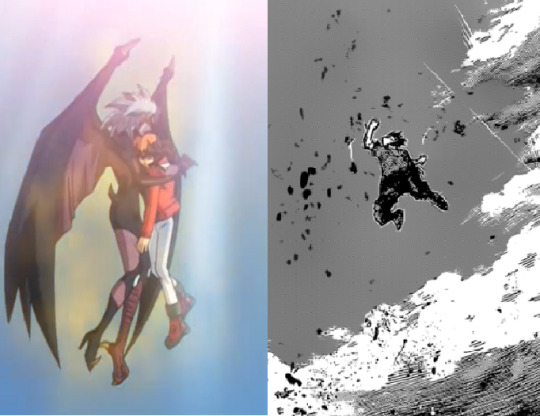
SHIGARAKI VS. YUBEL: HOW TO SAVE YOUR VILLAIN
The failure of Deku to save Shigaraki isn’t just a tragic conclusion for Shigaraki’s arc, it’s also My Hero Academia failing as a story. When I say the story failed, I mean the story has failed to answer any of the questions it asked its audience. It’s themes, character arcs, everything that communicates the meaning of the story to the audience is no longer clear.
Saving Shigaraki was the central goal of not only the story itself, but the main character Deku. By failing in its goal you can’t call this a good ending. In order to illustrate why this goal of saving the villain is so important to both Deku’s character and the central idea of MHA, I’m going to provide a positive example in Yu-Gi-Oh GX were the main character Judai successfully saves their villain. One of these stories fails, and the other succeeds. I will illustrate why under the cut.
BROKEN THEMES = BROKEN STORY
When artists draw they have to consider things like perspective, anatomy, shading, light, coloring. Drawing has rules, and it’s hard to produce good art without knowing these rules beforehand. If I draw something that has bad anatomy, you can criticize me for that.
Writing has rules, just like drawing. The rules of storytelling are important because writing is an act of communication. You can write whatever you want, just like how you can draw whatever you want, but if you break the rules the audience won’t understand what you are trying to communicate.
When I refer to MHA as a broken story, I am referring to the fact that it has broken the rules of storytelling. As this youtuber explains.
“I guess we should first define what broke and broken even means in this context. Has the story turned into an unintelligible mess? Not really. Value judgements aside, the narrative is still functional and fulfills the criteria of being a story. So how can a story that still functions be broken? Maybe to you it cannot. But to me a story that is still functional isn’t enough. What I mean when I say MHA is broken is that it’s lost something crucial. A codifying style of structure, pacing and payoff that until a certain point was the core of its identity.”
I could launch into a long-winded explanation of what themes are, but for the sake of simplicity I like to define themes in terms of “Ask, and answer.” The author asks a question to the audience, and then by the end of the story provides an answer. The audience is also invited to come up with their own answer which prompts them to think about the story on a deeper level. The question both MHA and GX are asking both its main characters and the audience is “Can you save the villain?” with the additional complicated question of “Should you save the villain?” This post will detail how both stories go about answering those two questions, and more importantly why those answers matter for the story.
With Great Power… You know the rest.
My Hero Academia and Yu-Gi-Oh Gx are actually similar stories once you get past their superficial differences. MHA is a story with way better worldbuilding, compared to a society where everything revolves around the trading card game, and people go to school to be better at a trading card game.
However, if you get past that. They are both bildungsroman, stories about the main characters growing up into adults. They both have an academy setting where the goal is for the main character to graduate and enter the adult world. They are both shonen manga. GX is the sequel of Yu-Gi-Oh a manga that ran in Shonen Jump the exact same magazine as MHA. The biggest point of comparison is their main characters, who both start out as young and naive who are driven by their admiration of heroes. Deku is a fan of All Might who wants to become a hero despite not having a quirk, because he loves All might who saves everyone with a smile. Judai’s entire deck archetype revolves around “Elemental Heroes’ and later ��Neo-Spacians” who are all based on popular sentai heroes like ultraman.
The central arc for both characters is to grow up. Growing up for both of them not only requires figuring out what kind of adult they want to be, but also what kind of hero they want to be.
Now I’m going to drastically oversimplify what a character arc is.
A character arc first starts out with the character being wrong. Being wrong is essential because if the character is right from the beginning, then there’s no point in telling the story. A character often holds the wrong idea about the world, or has some sort of flaw that hinders their growth. The narrative then needs to challenge them on that flaw. It usually sets up some kind of goal or win condition. That flaw gets in the way of a character “winning” or achieving their goal, so they need to fix that flaw first. If their ideals are wrong, then they need to think about what the right ideals are. If they’re too childish, they need to grow up. If they have unhealthy behaviors or coping mechanisms, they need to unlearn it and require better ones. Otherwise, that flaw will keep sabotaging them until the end.
I’m borrowing the word “win condition” from class1akids here because it’s an incredibly appropriate terminology. Midoriya needs to do “x” in order to win, otherwise this victory doesn’t feel earned. The “x” in this case is usually character development. As I said before, a story where the main character hasn’t changed from beginning to end feels pointless. Especially in Deku’s case, he was already a brave, strong hero who would charge right into battle and defeat the bad guys in chapter one, so him defeating Shigaraki in a fist fight doesn’t represent a change.
The story sets up not only “What does the hero need to do to win?” but also “How does the hero need to change in order to win?” A character either meets these requirements before the end of the story, or they don’t and usually this results in a negative ending.
MHA in its first half quite clearly set up both the final conflict of saving the villains, and also that saving the villains is its “win conditions.” The hero shouldn't be allowed to win without first fixing this flaw.
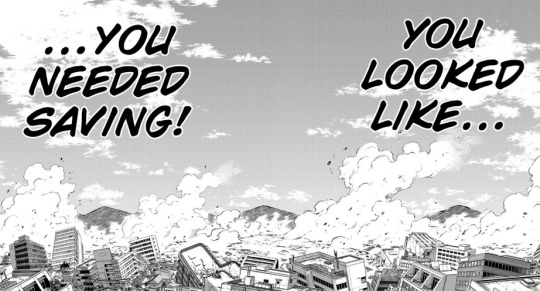
From this panel onward the central question Deku is forced to answer shifts from “Am I strong enough to defeat ShigarakI” to “Can I save Shigaraki?” However, much earlier than that All Might goes on to basically set up the win conditions of what makes the ultimate hero as someone who “Saves by winning, and wins by saving.”
All might: You can become the ultimate heroes. Ones who save by winning, and win by saving.
Therefore the story has set it’s criteria for what kind of hero Deku needs to become. If he wins without saving, then he’s failed to become what the series has set up as the Ultimate Hero.
Shigaraki and Yubel aren’t just narrative obstacles, or boss monsters to be killed like in a video game. They are narrative challenges, which means that the character can’t grow in any way if they don’t answer the challenge presented by the characters. They are villains who actively resist being saved, to provide a challenge for two heroes who define their heroism by saving others. The challenge they pose adds a third question to the story and the main characters.
"Can I save the villain?"
"Should I save the villain?"
"If I don't save the villain, then can I really call myself a hero?"
In other words the decision they make in saving, or not saving their final antagonist defines what kind of hero they are. In Deku’s case it’s even more critical he defines what hero he wants to be because the MHA is also a generational story, and several of the kids are asked to prove how exactly this generation of heroes is going to surpass the last one. The kids growing physically stronger than the last generation isn’t a satisfactory answer, Deku getting strong enough to punch Shigaraki hard is not a satisfactory answer, because we are reading a story and not watching a boxing match.
I’m going to focus on the last two questions though for a moment. Many people who argue against saving villains like Shigaraki argue he is a mass murderer and therefore isn’t worthy of salvation. However, the act of saving Shigaraki isn’t a reflection of Shigaraki himself, but rather the kind of hero Deku wants to be. It all boils down to Spiderman. In the opening issue of Spiderman, teenage Peter Parker is bitten by a radioactive spider and suddenly gains super strength, the ability to stick to walls along with other powers. However, being a teenager he uses these powers selfishly at first. He doesn’t feel the obligation to use his powers for other people, and therefore when he sees a robbery happening right in front of him he lets the robber go. However, because he lets the robber go, the robber then attempts to hijack a car and kills his Uncle Ben in the process. If Spiderman had stopped the robber then he might have prevented that from happening. He had the power to stop the robber, but he didn’t feel responsible or obligated to save other people. As a result Uncle Ben dies. It’s not enough to have power, ti’s how you use that power that reflects who you are, therefore: “with great power comes great responsibility.”
The choice to save Shigaraki actually has little to do with whether or not Shigaraki is redeemable, but rather how Deku chooses to use his power, and what he thinks he is responsible for reflects who Deku is as a person. Deku himself also clearly outlines how he wants to use his power, that One for All is a power for saving, and not killing.
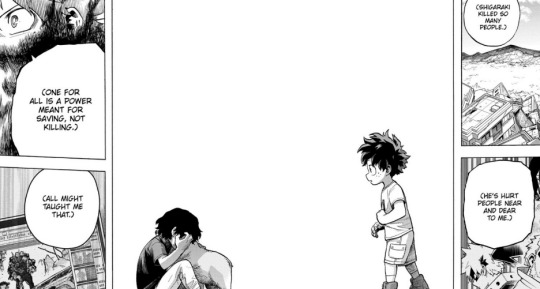
How he uses his power reflects Deku’s ideal in saving others, and therefore if he doesnt use his power to save, then he’s failed to live up to his ideals. It's not whether it's morally right to save a murderer like Shigaraki, but rather the way Deku wants to choose to use his power. It's about whether he feels the responsibility to save others.
Judai explores an incredibly similar arc to Deku. They are basically both asked what kind of responsibilities a hero is supposed to have, which is also a metaphor for growing up to handle the responsibilities of adulthood. As both characters start out with incredibly naive and childish ideas about what a hero is. Therefore realizing what a hero is responsible for is key to them growing as a character. However, Judai is different from Deku. In some ways he’s more like Bakugo. Judai is a prodigy who’s naturally good at dueling. He doesn’t duel to save others, but rather because duels are fun and he’s good at it. He’s very much like Bakugo, who admired All Might as a hero just as much as Deku did, but admired the fact that he was strong and always won rather than he saved others.
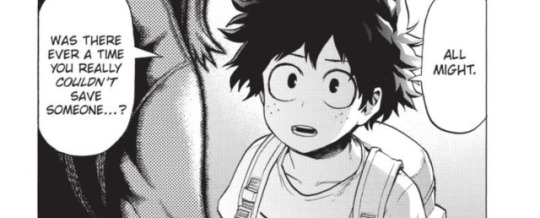
However, I would say both Deku and Judai are questioning what a hero is responsible for. They are both asking if they have the responsibility to use their power to save others. If they have to fight for other people, just because they have power. His first big challenge as a character comes from Edo Phoenix, who calls out Judai for not thinking through what it means to be a hero, and what responsibilities heroes carry. Judai duels because he thinks it’s fun. He will show up to duel to help his friends, but that’s because he’s the most powerful person in the group. Even then it’s because he finds fighting strong opponents to be enjoyable. Bakugo will beat up a villain, but for him it’s more about winning then if the action will save someone or not.
Judai is more often than not pushed into the role of being a hero, he doesn’t play the hero because he’s a particularly selfless person, and he’ll often avoid responsibility if not forced. He has power but no sense of responsibility and the narrative calls them out as a problem.
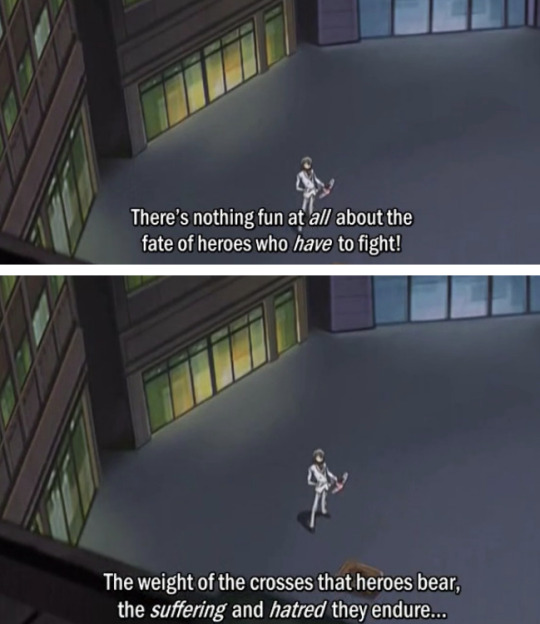
Edo: Can you even fathom that, Judai?
For Judai, he can’t understand the responsibility of being a hero. For Deku, he idealizes heroes so much he can’t understand that there are people out there the heroes have failed to save. These two callouts towards Deku and Judai are discussing similar because they’re both discussing where a hero’s responsibilities lie. Is a hero responsible for saving everyone? Is someone strong like Judai responsible for using their strength to help other people?
Judai’s arc continues into the third season where he’s not shown to just be naive but ignorant. He’s not just childish, he actively resists growing up because he doesn’t want to take on adult responsibilities.
THe same way that Deku just decides not to think about whether or not All Might failed to save people in the panels above. However, in Judai's case he's actively called out for his choice to remain ignorant.
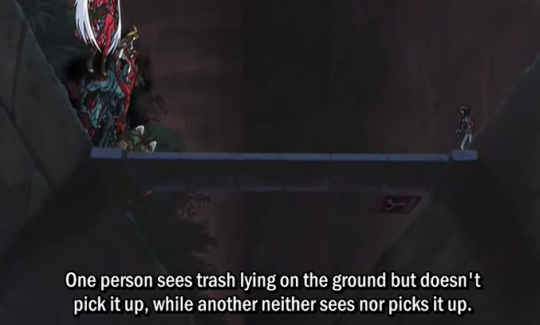
Satou: Now, which one is at fault? Judai: Isn’t it the guy who saw it, but didn’t pick it up. Satou: Not quite. If one is aware of the trash that fell, it may be picked up someday. But there is no possibility fo the unaware one ever picking it up. Judai-kun you are the foolish one unaware of the trash that has fallen. Judai: Are you calling me out for how I am? Satou: Your behavior towards me was atrocious. The worst was attending class only for credit, even if you were there you only slept. Judai: Yeah, I know. I was all bad, but it wasn’t that big a- Satou: It is important. You see, one by one, the students inspired by your attitude were losing their motivation. Now if you were a mediocre duelist, then this would not be an issue. Satou: However, you are the same hero who defeated the three mythic demons. Every single student in the academy admires you. You should have been a model for this academy. Judai: Me, a role model? Are you kidding? I just do whatever I feel like doing. Satou: Great power comes with great responsibility. Yet, as you remain unaware of that, you’ve spread your lethargy and self-indulgence.
seems like a minor issue, but look how Judai responds to the accusations. “I just do whatever I feel like doing.” Satou is arguing that Judai should pay attention to the influence he has on others because of his power, because how he chooses to use that power affects others. However, Judai chooses to actively not look at the consequences of his actions because he doesn’t want to take on that level of responsibility, and therefore he’s looking away from the trash.
While it seems like it doesn’t matter in Satou’s specific example, not thinking of the consequences, or how you use your power can have unexpected consequences. Spiderman doesn’t feel like it’s his responsibility to stop a bank robber, and that bank robber shoots his uncle. You could still argue it’s not Spiderman’s responsibility to stop every crime in the world, and I guess no one owes anyone anything from that point of view - but Spiderman failing to act responsibility had the consequence of directly hurting someone else.
Spiderman has to live with that consequence because it was his own Uncle that was hurt. This is where we really reach the duality of Judai.
In GX, Judai is, symbolically speaking, The Fool of the Tarot Deck, the Novice Alchemist — a person brimming with infinite potential, yet one who is also supremely ignorant, who walks forward with his eyes closed and often unknowingly causes harm in his great ignorance. In this, he is very much the embodiment of the faults we most commonly associate with teenagers — selfishness, recklessness, shallowness, a lack of dedication or empathy when it’s most needed. Like most people, he has good traits that work to balance out some of the above, but his narrative path through GX ends up being that of the flawed hero undone by his faults — and then that of the atoner, the repentant sinner. In his case, the mistakes of his teenage years are the catalyst for his growth from a boy into a man burdened with duty and purpose. Judai is someone with infinite potential, with great power, but also ignorant on how he should use that power, and that makes him an incredibly flawed hero who needs to learn how that power should be used.
Deku similarly exists in a society where heroes deliberately turn a blind eye to the suffering of a certain type of victim. Shigaraki’s speech heavily resmebles Satou’s speech about garbage on the side of the road.
Shigarali: "For generations you pretended not to see those you coudln't protect and swept their pain under the rug. It's tainted everything you've built."
Deku shares Judai’s ignorance, because he’s not only a part of a system that doesn’t even see trash on the side of the road, but he also worships heroes so much that he’s incapable of criticizing them. If Deku saw the flaws of heroes, but at first didn’t have the courage to speak out, but eventually gained the courage that would be one thing. However, if he doesn’t see the flaws of heroes, then the problem will never be fixed.
There are also consequences for both Judai and Deku failing to use their powers responsibly. These consequences take the form of the villains who came about because of all of society’s ignorance to the suffering of victims (Shigaraki) and because of the main character’s ignorance to their suffering (Yubel). Shigaraki and Yubel are also explicitly victims that the heroes failed to save, turned into villains who are active threats to the heroes.
Should I save the villain?
The answer is yes, because the decision to save is reflective of the kind of hero each character wants to be. Each story clearly sets up that Deku and Judai aren’t punisher style heroes who shoot their villains, they are being set up as heroes who save. Deku needs to “save by winning.” As for Judai, a big deal is made of Judai’s admiration for another character Johan who represents a more idealistic kind of hero. Johan unlike Judai is someone who duels with a purpose, something Judai outright says he admires because he’s empty in comparison.
Judai: Johan what have you been dueling for? See, it’s about fun for me… Well, for the surprise and happiness too. I guess I do do it for the fun. Sorry, I guess I put you on the spot by asking out of nowhere. Johan: What’s this about Judai? Judai: It’s nothing. Johan: I suppose there is one goal I have. Johan: Even if someone doesn’t have the power to see spirits, they can still form a bond with a spirit. That’s why I do it for people like him. [...] Johan: I'll fight for everyone who believes in me, and I'll do it with my Duel Monsters. Judai: I'm jealous you've got feelings like those in you.
Becoming a hero who uses their power to help others isn’t just a goal the story sets for Judai, it’s a goal that Judai sets for himself because of his admiration for Johan. Johan represents the idealistic hero Judai wants to be, but is also held back from because of his personality flaws. Johan represents the kind of heroic ideal that Deku is aspiring to be.
Johan’s ultimate goal isn’t punishing the wicked, but to use his power to save others.
Johan: Judai, it was my dream to save everyone through my dueling!
The story sets up the idea that it’s not enough for Judai to simply be strong, he’s also challenged to become a savior who uses his power to help others like Johan. Deku needs to “save by winning” and Judai needs to “Save everyone through his dueling.” However, Johan also adds another condition to what saving means. His idea of saving isn’t to defeat a villain, but rather his dream is to help connect spirits and humans together, even if there are humans who can’t see spirits. Johan doesn’t save people with the power of physical force, but rather the power of human connection.
Should I save the villain?
Here the answer is "Yes", because wants to become more like Johan someone who uses their power to help others not just for themselves. Then we reach the third question
If I don't save the villain, can I really call myself a hero?
It once again comes to power and responsibility. Heroes have great power, and they are responsible in how they use that power, if they use it irresponsibly then there are consequences. Shigaraki wants to destroy hero society, because the heroes irresponsibly use their power to turn a blind eye to everyone’s suffering.
People suffer when heroes fail to live up to their responsibilities. The entire conflict of season 3 is created by Judai failing to save Yubel. If Judai had helped Yubel when they most needed it, instead of abandoning them, then Yubel would never have been twisted by the light of destruction, would never have attempted to teleport the school to another dimension, would never have attacked all of JUdai’s friends.
These consequences matter. Deku can turn his eyes away from Shigaraki’s suffering, but let’s say a hero failed to stop a robbery, or rather he didn’t even try, and because of that his mom was shot and died in the street. Would Deku consider the man who failed to stop a bank robbery a hero? When Spiderman let a bank robber go instead of trying to stop him, was he being a hero in that moment? Both the stories and the characters themselves have defined heroes as people who use their powers to save others, therefore if Judai and Yubel fail to save their villains then they can’t be called heroes by the story’s own definition. Now let’s finally return to the question of "Can I save the villain?"
Was there ever someone you couldn’t save?
m going to start with Yu-Gi-Oh Gx as a positive example of how to save your villain. Gx works for two reasons. One, it’s established from the start that Yubel isn’t beyond salvation, and two, it makes it so Judai can’t win without saving Yubel. The conflict of the story does not end until Judai makes the decision to save Yubel. In some ways the writing is even stronger because Judai is directly responsible for the pain and suffering that Yubel went through that turned them into a villain in the first place. Yubel isn’t just a victim, they’re specifically Judai’s victim.
Yubel is a duel spirit who is also essentially Judai’s childhood friend. A duel spirit just like the kind that Johan wants to save. During their childhood Yubel got too overprotective of Judai, and started to curse his friends for making him cry or upsetting him in any way. Until everyone Judai’s age started avoiding him and Judai became all alone with only Yubel for company. Judai’s decision was to abandon Yubel at that time. He took the yubel card and shot them into space, hoping that being bathed in space rays will somehow “fix” what was wrong with them. I know that’s silly but just go with it. Judai abandoning Yubel had the unintended consequence of Yubel being subjected to the light of destruction, a corrupting light that subjected Yubel to years of pain. This pain literally takes the form of Yubel burning alive.
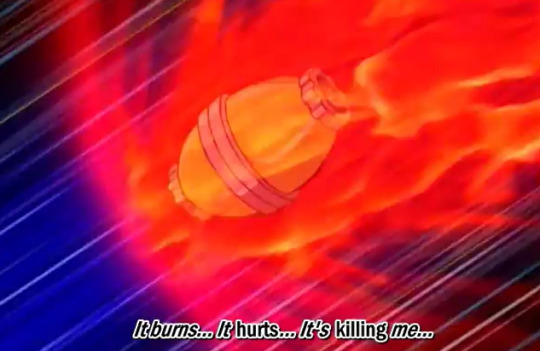
Yubel connected to his dreams called out for Judai every night, only for Judai’s parents to give him surgery that repressed his memories of Yubel causing him to forget them entirely. Yubel then spent the next ten years alone in space, continuously subjected to painful torture, with their cries for help being ignored.
"I was suffering even as you came to forget about me..."
Yubel is then met with the question of how can Judai treat them this way if they loved him so much? As from Yubel’s perspective, they’ve only ever tried to protect Judai, only for Judai to not only throw them away, but subject them to painful torture and ignore their cries for help. Judai effectively moves on with his life, goes to duel academy, makes friends while Yubel is left to suffer in silence all but forgotten. This is where Judai’s ignorance has serious plot consequences.
It’s not just the pain that Yubel endured that made them snap. It’s that their pain went ignored.
Yubel holds out the faint hope that Judai will answer their calls fro help until they finally burn up upon re-entry into earth’s orbit. At which point they’re left as nothing more than a single hand crawling on the ground. Yubel who cannot fathom why Judai would cause them so much pain, and then forget about them, convinces themselves that Judai must be causing them pain, BECAUSE he loves them.
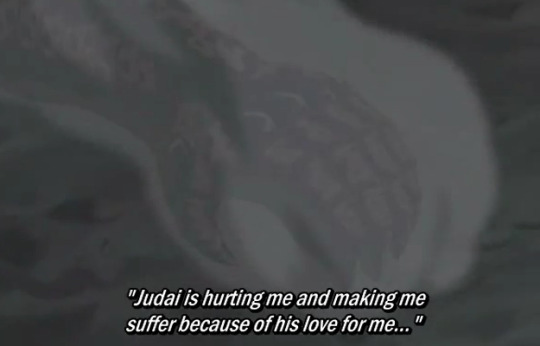
But you see, I couldn't possibly forget about you in the time that I've suffered...
Judai is allowed to move on with his life, to make friends, to spend the next ten years doing so while Yubel is subjected to ten years of agony. When they finally escape their painful torment, they see all the friends Judai has made while they’re left alone and forgotten. However, Yubel’s goal isn’t revenge. Rather, it’s to make Judai share and recognize their pain. WHich is why I said it’s not the fact that they were made to suffer, but their suffering is ignored. Yubel’s entire philosophy revolves around the idea that sharing pain is an expression of love, and that they and Judai share their love for each other by hurting each other.
"That's why I sought to fill all those linked to you, your world, with both sadness and anguish..."
For Yubel, making all of Judai’s friends suffer and Judai themselves suffer is a way of making them and Judai equals again. They want to show “their love” for Judai, but it’s more about forcing Judai to recognize the pain he’s caused them by forcing him through the same pain. Yubel’s philosophy of sharing pain is actually a twisted form of empathy.
They’re not entirely wrong either, that even people who love each other can cause each other pain, and that if one person is suffering alone in a relationship or the suffering is one-sided then there’s something wrong with that relationship.
Yubel: I get it now… You weren’t in love, with Echo. Yubel: No.. you may have loved her just enough to clear the conditions in palace for you to control Exodia, but the you didn’t truly love each other. Yubel: You were only unfairly hurting her, while you stayed unharmed. You wouldn’t suffer. You wouldn’t suffer. You wouldn’t be in pain. Amon: What are you getting at? Yubel: I’ve been hurt! I’ve suffered! I’ve been in pain. That’s why I’m making JUdai feel the same things I did!
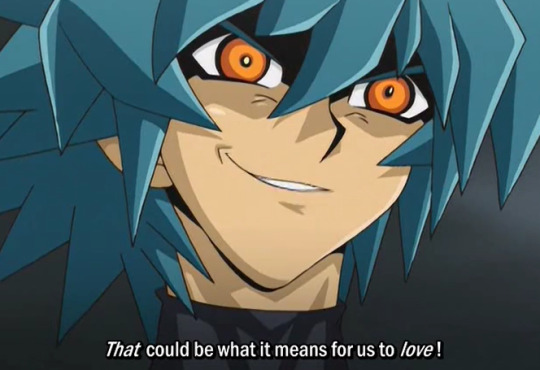
Yubel’s twisted theory of love, is a pretty thinly veiled cry for empathy.
They break out into tears when talking to Amon about the way they’ve hurt and suffered. They clearly state upfront that their goal is for Judai to recognize their love. One of the first things they say to Judai is a plea for Judai to remember them.
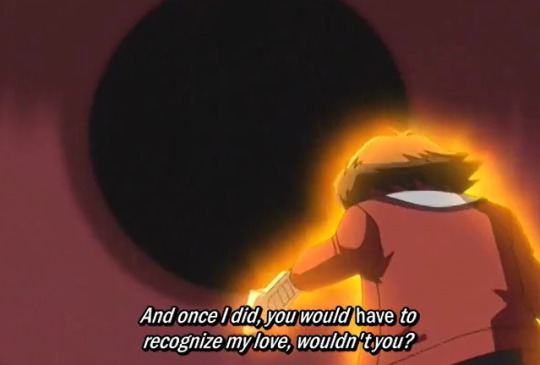
Yubel is presented as a very human character suffering through a lot of pain throughout their entire villai arc, they break down into tears multiple times, they cry out in agony, they're visibly suffering and you see their mental walls begin to break down when Judai denies them any empathy.
Yubel is actually incredibly clear and straightforward about their desire to be saved by Judai. However, Judai doesn’t lift a single finger to help Yubel the entire arc, even though they themselves admit they are directly responsible for Yubel’s suffering but they helped create who they are today.
Judai plunges into a different dimension and gives up everything to save someone, but it’s Johan, not Yubel they try to save. You have Johan, the perfect friend, and perfect victim that Judai gets obsessed over and will not stop at anything to save, and then you have Yubel, the imperfect victim that is actively harming Judai and all of his friends that Judai chooses to ignore. The whole season Judai only focuses on saving the perfect victim Johan, and this is clearly shown to be a flaw. Judai doesn’t just ignore Yubel to save Johan, he also ignores every single one of his friends.
Judai only caring about saving Johan, and deliberately ignoring and abandoning the friends who came with him to help, essentially abandoning them the way he did Yubel leads to another consequence. After he abandons them they get captured, rounded up, and actually die and become human sacrifices.
Losing his friends, causes Judai to snap. Judai becomes the supreme king and decides power is all that matters; he starts killing duel spirits en masse in order to forge the super polymerization card. Which means being left alone, suffering alone, being abandoned by everyone causes Judai to snap the exact same way that Yubel did.
In fact Judai is only saved from his darkest moment, because two of his friends sacrifice their lives, trying to get through to him and appeal to his humanity. At that point Judai’s friends could have just chosen to put him down like a mad dog, to punish him for the amount of people he’s killed, but instead they try to save him because of their friendship.
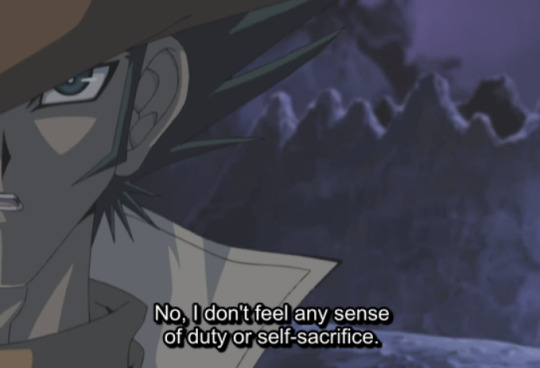
I just want to save my friend. That is all.
By the time Judai is facing Yubel in their final fight, Judai doesn’t have the moral highground against Yubel in any way whatsoever. They’ve both lashed out because of the pain they endured and killed countless people in the process of lashing out. The only real difference between them is that Judai is lucky. He had friends to support him at his lowest point, while Yubel didn’t. Does Judai learn from Jim’s example, and go out of their way to save Yubel the same way they were saved because Yubel is still a friend? Nope, Judai tries to kill Yubel at this point.
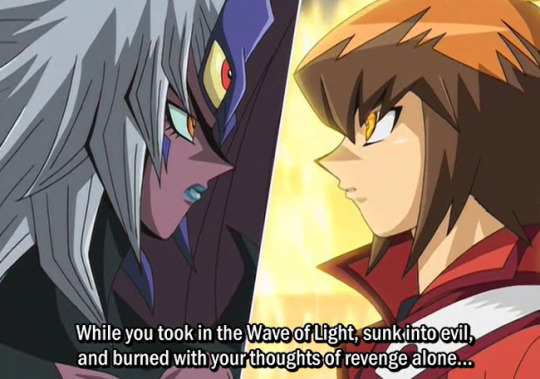
I made a lot of friends... And they all taught me something… real love is wide enough, large enough and deep enough to fill the universe. Your so-called love is only a conceited delusion.
Like, Judai, sweetie baby honey darling. How was Yubel supposed to make friends when they were floating in the empty void of space?
Judai hasn’t learned, they are still ignorant, and still turn a blind eye to Yubel’s suffering. After all if his love is wide enough, large enough,and deep enough to fill the universe then why don’t thy have any room in their heart whatsoever for empathizing with Yubel?
Judai making friends while Yubel was trapped in space doesn’t make Judai a better person than Yubel, it makes Judai lucky. Judai doesn’t even appreciate that luck, because he treats his friends like garbage. It’s not about whether Yubel is worthy of salvation, because Judai is a mass murderer and his friends still went to great lengths to save them anyway. It’s that Judai doesn’t want to empathize with Yubel, because they still want to remain ignorant and irresponsible. Judai wants to continue playing hero, with a very black and white definition of what a hero is. By this point Judai’s killed lots of people, but if he makes Yubel the villain in the situation, he can keep playing hero. He doesn’t have to look at himself and what he’s done, because blaming everything that happened on Yubel and then putting Yubel down like a mad dog allows Judai to absolve his own guilt. Judai practically ignores Yubel’s cries for help, even when Yubel spells it out for them.

I couldn't have lived with the heartache unless I felt that I was being loved...
At this point Yubel themselves acknowledges that their love was just a delusion. That it was a coping mechanism, because they couldn’t live with all the pain otherwise. WIthout it they would have just died, which makes Judai unmoved. The implication here is that Judai thinks yes, Yubel should have just died in that crater. It would have been easier for Yubel to die a perfect victim, then for Yubel to crawl out of that crater and go on to hurt other people. While that may be true the same can be said for Judai - it would have been better if Judai died rather than become the Supreme King. His friends could have put him down like a mad dog, you could have even called that justice - but they didn’t. Judai making no attempt to save Yubel isn’t because he thinks it’s morally wrong to save someone who’s killed as many people as Yubel has, or because he thinks he can’t forgive Yubel, it’s because Judai is taking the easy way out. Johan is a nice, easy victim to save, because he’s Judai’s perfect boyfriend, while Yubel is a complex victim that requires Judai to understand their suffering. Even the act of saving Johan isn’t about Johan himself, it’s about the fact that Judai feels guilt over Johan’s disappearance. What Judai wants isn’t really to save a friend, but to stop feeling guilty over that friend. Judai isn’t just disgusted by Yubel’s actions towards his friend, he also wants to avoid the guilt he feels over causing all of Yubel’s suffering, because it requires acknowledging the complex reality that he is both victim and perpretrator in this case, just as Yubel is both victim and perpetrator.
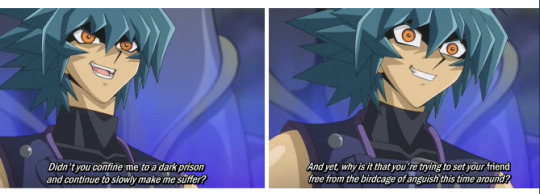
So how can an arc where Judai doesn’t try to save Yubel until the last possible minute, be better than an arc where Deku makes it his goal for the final act of the manga to save the crying boy in Shigaraki?
It’s because the story does not let Judai get away with his continual refusal to empathize with Yubel. Yubel’s entire character revolves around empathy, in the form of sharing pain. As a duel monster, Yubel’s effect is that they are a 0/0 attack monster who is immune to all damage, but when you attack them they deal all the damage back to you. Which means that Yubel will respond to all the pain they feel, by causing you just as much pain in return. Yubel is not a character who can be defeated in a fight, or a duel. In fact they’re the only Yu-Gi-Oh villain who never loses a duel once. The most Judai can do is duel them to a draw, and they draw three times. Yubel wins against everyone else who challenges them. In a way Yubel is like Shigaraki, the ultimate, unkillable enemy that can’t be done away with violence. Judai’s refusal to empathize with Yubel or attempt communication also makes them worse, every time Yubel is hurt they escalate. THe more Judai hurts them, the more they will hurt in return, it’s a cycle that will never be broken simply by killing Yubel, because Yubel is unkillable.
Not only that but the story has gone to great lengths to show that saving Yubel is the correct course of action. If Judai doesn’t save Yubel, he’s basically spitting on the selflessness Jim showed in saving him. In fact if he doesn’t save Yubel, Judai is contradicting his own words on what makes a good friend. Sho once asks Judai after witnessing his brother change, what he should do if a person you lov ehas changed into an entirely different person. What if they're a person you don't even recognize any more? A person you don’t even necessarily like anymore?
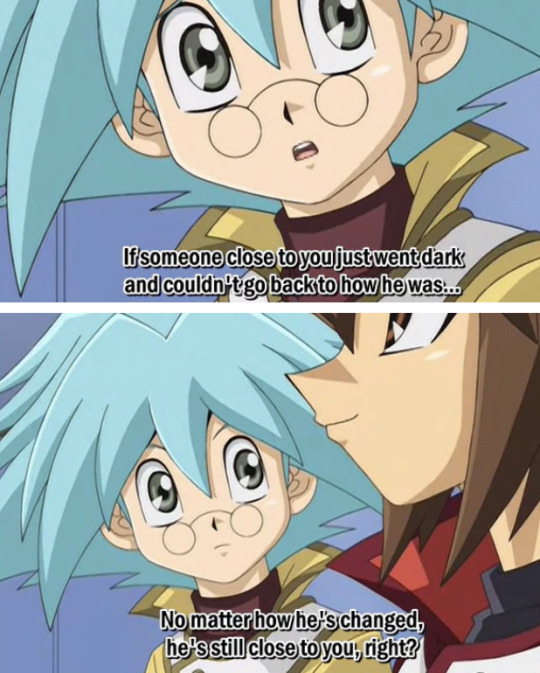
That's why if it were me. I'd probably just be looking after him until the very end, even if I didn't like him. I'd do it cause I think it'd prove that I care about him.
Judai doesn't even say that Sho is obligated to save his brother or morally redeem him, just that he has to keep looking at him instead of turning away or ignoring him.
Judai is being a bad friend, by his own definition. By choosing to deliberately look away from Yubel, Judai’s not living up to his advice for Sho for how you treat people you care about.
Which is why the resolution for Judai and Yubel’s arc is so important, because it’s done by Judai finally acknowledging Yubel’s pain, and promising to watch over them from now on, words that are followed by the action of physically fusing their souls together so they’ll never be alone again. Judai doesn’t just say pretty words about how they won’t ignore the crying child inside of Yubel, but instead he makes a sacrifice to save Yubel at risk to themselves to show their words are backed up by actions. Judai says Yubel will never be alone again, and then he commits.
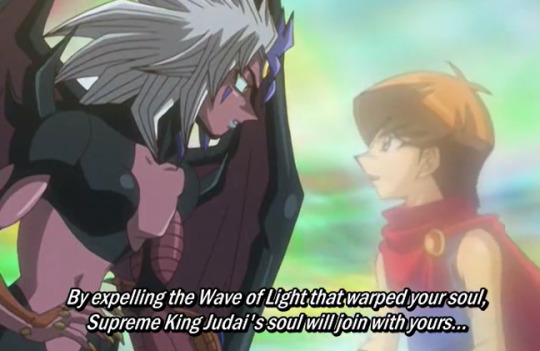
"And even if that means I won't exist anymore... I don't care."
Judai has resolved his character arc by this action, because Judai is finally taking on responsibility and that responsibility is watching over Yubel, so the two of them can atone together. Judai even says himself this isn’t an act of sacrifice on his part, but rather him finally accepting adult responsibilities.
Judai: I wouldn't sacrifice myself for you guys. I'm just going on a journey to grow from a kid into a man.
Judai needed to save Yubel to complete his character arc and grow as a person. If Judai hadn’t saved Yubel, he would have still remained an ignorant child. By learning not to turn a blind eye to Yubel’s pain, and also smacking sacrifices and physically doing something to atone for the way they ignored Yubel up until this point they’ve not only saved Yubel they’ve also done something to address their wrongs. This also continues into the fourth season where Judai’s personal growth results in him learning what kind of hero he wants to be as in Season 4 in order to atone for the spirits that Judai slaughtered, he decides to leave his friends behind and walk the earth with Yubel helping spirits and humans get along with each other. In fact Judai’s final speech as a character isn’t even about how strong he is as a hero, but how weak he is as a person.
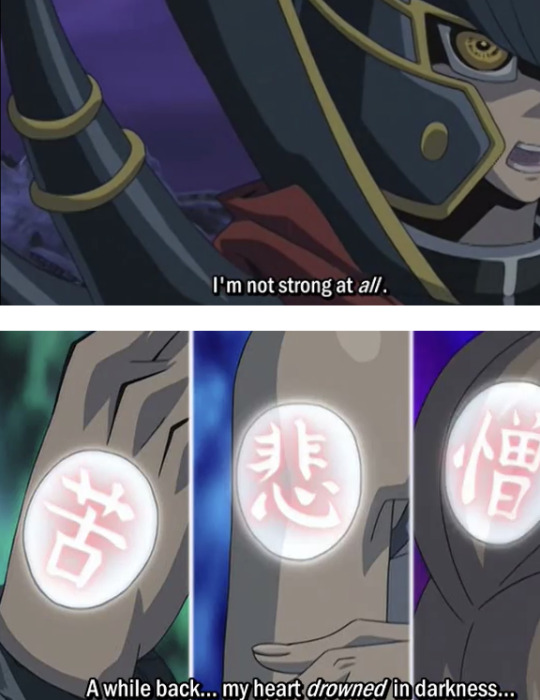
And I put my friends through some rough times. Form that, I figured a few things out... all I can do is believe in them.
The lesson Judai learned is because he’s weak, he needs to empathize and believe in other people the same way that his friends once believed in him when he was at his lowest point. Judai’s not the strongest hero, he’s the weakest one, but that gives him the ability to empathize with people who were lost just like he was, and guide them back from the darkness.
The story of how Deku became the worst hero.
I’m going to say this right now it might turn out next week that Shigaraki is just fine, and he’ll use the overhaul quirk to reconstruct his body. However, even if that happens Deku has completely failed at his goal of saving Shigaraki for the reasons I’ll illustrate below. In theory, Deku’s arc of saving Shigaraki, and therefore winning by saving should be much easier for the story to accomplish and also much less frustrating to watch. After all, Shigaraki has been around since the beginning of the manga, he’s literally the first villain that Deku faces. He’s also the first villain that Deku talks to, where he brings up the idea that there were some people All Might failed to save. There’s also many intentional parallels between the two characters, the entire manga is about their parallel journeys of becoming the next generation hero and the next generation villain. Shigaraki even directly quotes the line at one point that all he wanted was for someone in his house to tell him he could still be a hero, the same line Deku said in the first chapter was that he wanted his mom to tell him to be a hero instead of apoalogizing to him for being quirkless.
Not only is the setup for Shigaraki and Deku made obvious (Deku can redeem Shigaraki by telling him that he can still be a hero too), but Deku himself states out loud that he wants to save the crying child inside of Shigaraki.
Judai runs away from Yubel the whole time, whereas Deku is running towards Shigaraki and actively makes it his goal to understand Shigaraki and continue to see him as a human being rather than a villain. The story also makes it clear that saving Shigaraki is necessary to saving hero society as a whole. After all Yubel is just Judai’s victim. Whereas Shigaraki is the victim of all of society. He’s the crying child who was ignored. The cycle won’t be broken if heroes continue choosing to ignore people like Shigaraki, because more victims will grow up to replace him.
Shigaraki: Everything I've witnessed, this whole system you've built has always rejected me. Now I'm ready to reject it. That's why I destroy. That's why I took this power formyself? Simple enough, yeah? I don't care if you don't understand. That's what makes us heroes and villains.
Shigaraki rejects the world because the world continues to reject him. THe solution to this problem is not rejecting Shigaraki, because Shigaraki won’t go away, the system will just continue to reject people like Shigaraki. As long as heroes and villains don’t understand each other, they’ll keep being forced to fight and the conflict won’t end, because hero society is what engineers it’s own villains.
clear as day by the story itself. If the objective of saving Shigaraki is clear, then how exactly did the story fail in this objective? What went wrong? In this case it’s a failure of framing, and breaking the rules of “show don’t tell.” Stories are all about actions and consequences. When a character makes a certain action in a story, the way other characters around them, the world, and whatever consequences that action frames that action in a certain light. It provides context for how we are supposed to interpret that character in that moment.
For example, when a character does something wrong and another character directly confronts them over what they did wrong, that frames them as in the wrong. The story is criticizing the character for what they did wrong. Context is everything in a story. Stories are just ideas, so they require framing and context to communicate those ideas for the audience. Certain character attributes can be strengths or flaws depending on the context. My go to example is that if you put Othello in Hamlet, the conflict would be resolved in five seconds because Othello’s straightforward personality and determination would have him kill Hamlet’s uncle without questioning things. Whereas, Hamlet constantly questioning and second guessing himself would lead to the worst ending possible. However, if you put Hamlet in Othello, then Hamlet wouldn’t fall prey to Iago’s manipulations, because Othello doubts and questions everything so he wouldn’t believe Iago the way Othello did.
Hamlet’s contemplative and introverted nature can be a strength in one situation, and a flaw in another. Othello’s tendency to act without thinking things through can be a strength in one situation, and a flaw in another. Context matters, because context tells you how you’re supposed to interpret a certain characters actions, and therefore tells you more about that character. This is why people repeat “Show don’t tell” as the golden rule of storytelling, it’s one thing to say something about a character, it’s another to us the characters actions in the story itself to show them something about the character.
What’s even worse then breaking the rules of show don’t tell however, is telling the audience one thing, and then going onto show in the narrative something completely different. In that case the narrative becomes muddled and confusing to read. If I the narrator say “Hamlet is someone who overthinks everything” and then in the story Hamlet walks up to his uncle and kills him with no hesitation, then the narrator is straight up unreliable. It becomes impossible to tell as an author what message I’m trying to get across about these characters, because I’m telling you one thing and showing another.
This is why the writing fails in the second half of My Hero Academia because we are constantly told one thing, but then the story shows something entirely different and sometimes even contradictory to the thing we are being told.
Judai is a much worse hero than Deku, he always runs away from Yubel, and we’re never directly told that he’s supposed to save Yubel either. However, the narrative is incredibly consistent. Judai’s behavior of running away is consistent with his character. All the other character call Judai selfish for abandoning his friends (and they’re not even talking about Yubel). Judai is never painted in any positive light for his actions, therefore we as the audience understand Judai’s behavior is wrong and he needs to fix it. The narrative makes it clear that Judai needs to grow up, and Judai is never rewarded for his refusal to grow up, he’s ruthlessly chewed out, not by his enemies but also by his own friends. However, the narrative isn’t merciless on him either. Season 3 of GX is dark, but it’s not grimdark. Even when Judai loses his way, he’s still shown love and compassion by those same friends who go to great lengths for his sake. The narrative criticize Judai but it never insists that he’s beyond redemption and needs to be put down like a mad dog.
The message is very clear, that not only does Judai need to grow up, but he also deserves the chance to grow and change, which is why he should give Yubel a similar chance. In comparison the story sets out this clear narrative arc for Deku of understanding Shigaraki, but it never challenges him for failing to understand Shigaraki. If you listen to what the narrative says, how other characters describe Deku, and what Deku himself says and only read it on a surface level then yes, Deku’s goal is to save Shigaraki. If you analyze actions however, he is in effect just like Judai he never takes any meaningful action or steps towards Shigaraki, nor does he think of what saving Shigaraki might look like or entail.
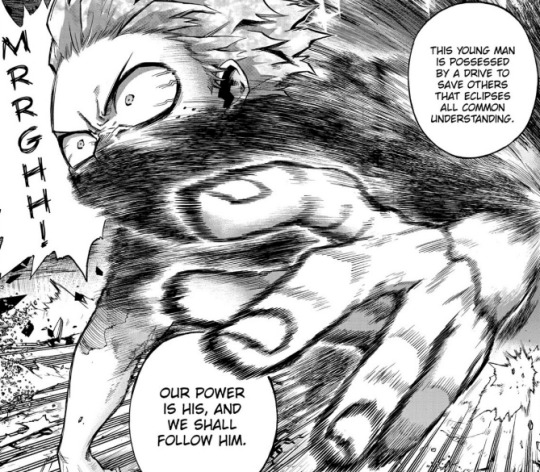
The story describes Deku as someone who is possessed by a drive to save others that eclipses all common understanding, but does the story give us any examples of that behavior?
Judai is characterized as a selfish, irresponsible child, and the story gives us countless examples of his immaturity and how it hurts others. Does the story of MHA do the same for Deku's purported virtues? Let’s run through Deku’s actions, step by step, the actions themselves and how they are framed in order to find any evidence that Deku possesses this drive to save others. Does Deku reflect at all on the question of:
Can Shigaraki be Saved?
Deku leaves on a journey to try to understand villains. When he makes a perfunctory attempt to understand and empathize with Muscle, and Muscle replies that some people are just evil does Deku keep trying to reach his heart? Nope, he just punches him.
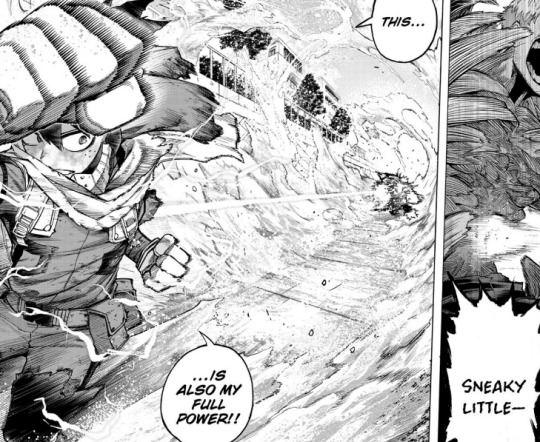
Well, if he’s failed in his goal of understanding a villain then does the story call him out on his failure? Does Deku face any sort of narrative consequence for that failure? Is he framed negatively for failing to understand Muscle, the same way that Judai is framed for abandoning Yubel? Nope. Deku doesn’t express any frustration at all over is inability to reason with Muscle. There’s also no negative consequence for Deku just choosing to punch muscle, it turns out that there was no reasoning with Muscle and some people are just bad eggs so Deku was right. It’s okay for characters to fail, but if a character fails and it’s not framed by the story as a failure then the writing itself as failed. Why even bother to include this scene in the first place if it doesn’t advance Deku’s character in any way? This scene in spite of showing Deku failing to understand someone actively paints Deku in a positive light, because of how much stronger he is ow that he can OHKO a guy that gave him trouble all the way back in the camp arc.
This scene doesn’t tell anything about Deku as a character, it just makes him look cool. In fact that’s precisely the problem, Deku isn’t adequately challenged as a character, because he’s never allowed to fail. Even when he does obviously fail at the things the narrative set out for him to do, he’s never challenged on those failures, because the priority isn’t to make Deku grow, it’s to make Deku look good. As I said before, Judai is the hero because he’s the weakest. Deku is the hero because he’s the strongest. Well, next a big flaw on Deku’s part is that he worshippd the same heroes that were making the world corrupt. Heroes like Endeavor who created people like Dabi. So, does Deku take action to either criticize the older generation of heroes, or separate himself from them in order to try to be better than them? Nope, he teams up with them. Not only that, Deku can’t do something as simple as tell Gran Torino out loud about his plans to save Shigaraki. If Deku feels that Shigaraki is worthy of salvation then he should at least try to make an argument here about his ideal of saving others.
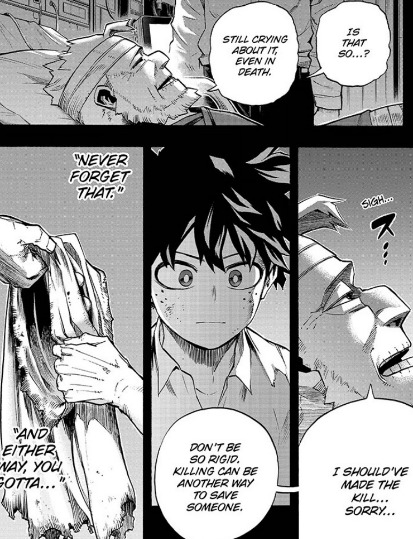
Now here’s the thing, if Deku hadn’t directly looked at the camera and told us he wanted to save Shgiaraki, would we be able to deduce his intentions from his actions? If you took away all of Deku’s internal monologue, and just showed him punching Muscular and saying nothing when Gran Torino says he may have no choice but to kill Shigaraki would anything about Deku’s actions indicate that he wants to save Shigaraki? Let me use avatar the last airbender as a positive example for a moment. People say that Aang’s desire to spare Ozai’s life comes out of left field, but like if you analyze Aang as a character down to their bending, and the way they react in situations they always prefer de-escalation, or taking a third option as opposed to confronting things head on. It’s literally why Toph says Aang has trouble learning earth bending, because as an airbender, he always tries to look for some other way to solve the problem, instead of a direct confrontation with force. As early as season one, Aang tells Zuko someone who has tried to kill him several times that he was friends with someone from the fire nation one hundred years ago and in a different situation they could be friends. Aang’s desire to save the Firelord may not have been told to us until the last possible minute, but Aang’s aversion to violence has always been a part of his character from the beginning. However, Deku never shows any similar aversion to violence. There’s basically no example where he ever tries to de-escalate a situation, or he avoids a conflict by seeking a third option.
Anyway, let’s move onto the next example. In the confrontation where Lady Nagant fights Deku, when Deku learns the fact that the heroes were employing government hitmen to attack people for uhh… exercising free speech does Deku give any reaction to this information? When Lady Nagant says that Deku is only going to bring back the status quo, does he show her any meaningful evidence that he won’t do that.
Deku’s response is because the world is so grey, he needs to extend a helping hand to others. Which you know what thay could be a response. Deku saying that his response to the corruption of the hero world is that he now understands that society led some people down the wrong path, so his way of addressing the wrongs of that society is lending a helping hand to as many people as possible even people he used to think was irredeemable.
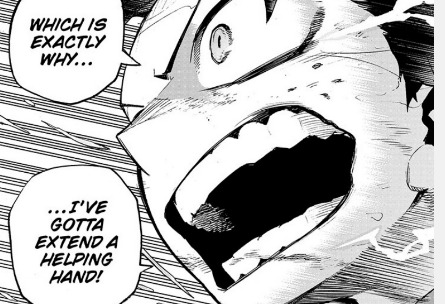
I will give Deku the benefit of the doubt, I think this is an acceptable answer. I can’t save everyone, but that’s not going to stop me from trying to save as many people as possible and maybe I can save people who were this society’s victims on the way too. However, does Deku demonstrate his resolve to extend a helping hand in any meaningful way.
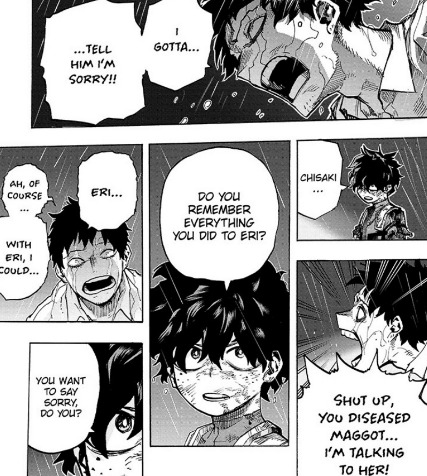
Deku is met with an armless, insane Overhaul who’s begging for someone to help heal his father figure in the Yakuza from his coma. This isn’t like Muscular who insists that there’s no helping him, Deku is met face by face with someone asking him for help. Deku’s gotta extend a helping arm whenever he can, because he knows some people were abandoned and led astray by this society… Unless that person is someone he doesn’t like personally. At which point he only helps them on a conditional basis. We are told Deku will save anyone and everyone, but Deku is met face to face with an armless man who is begging for help and Deku’s does nothing to help him. Deku’s not criticized for refusing to help overhaul either, it’s never brought up again. When Deku begins to experience a mental breakdown because of all the people he’s trying to help in the Dark Deku arc, we are told this is the result of Deku trying to save everyone, but we do not see Deku attempting to save a single villain after Muscular and Nagant.
He exhausts himself beating up villains that AFO sends after him, and only helping innocent civilians. Which would be fine if this arc were about how Deku is running away from his real responsibilities the same way that Judai was running, but that’s not what we’re being told. We are told that this is all part of an arc of Deku learning to understand villains and be a hero.
Deku is asked “Can you save Shigaraki?” by the story, but Deku never at any point has to deliberate on that question. Judai doesn’t deliberate on that question either, but him choosing not to think about things and stay ignorant is the point.
It’s actually fine to make Deku stagnate as a character. It’s fine to have him take the easy way out by just punching villains and giving up on them after one conversation. It’s fine for him to be empathetic to other people’s suffering, or even self-righteous. It’s fine for him to be ignorant.
He could be all of those things if it was a part of a narrative teaching him to unlearn his behavior. In fact the narrative might have been better if Deku started out by saying he didn’t want to save Shigaraki, that there was no choice but to kill him, because then at least his actions would be consistent with his words. Then his lack of empathy and his tendency to resort to violently beating up villains instead of avoiding violence would be character flaws he could work on. Deku however, is presented to us as this empathic hero who is always willing to give others a second chance though he never actually sticks his neck out in order to do so. Continuing on with our slow crawl through MHA, one of Deku’s friends is revealed as the traitor. Deku has a heartwarming scene fo saying that Aoyama can still be a hero, but look at his actions. He lets the adults in the room physically tie Aoyama in a straightjacket and imprison him, for the crime of… doing bad things while he was in a hostage situation. Apparently, if a bank teller helps the bank robber by giving them money when the robber has a gun to his head, the swat team should just snipe the bank teller. Not only does he not defend Aoyama against the adults, or stand up for him, or tell the adults they’re wrong to treat Aoyama a clear cut victim who had a gun to his head and was bing held hostage like he’s a villain - he also lets the adults use Aoyama an innocent victim as bait in order to lure out AFO. Deku tells Aoyama he can still be a hero, but he doesn’t defend Aoyama as a victim of being taken hostage, nor does he stop the adults from further taking advantage of him and throwing him right into danger. Some people are just led the wrong way that’s why they need to be extended a helping hand, but fuck Aoyama I guess. He needs to earn the right to be sympathized with by physically putting his life in danger.
Deku can’t even go out of his way to save a friend who he’s known for the better part of a year, when that friend is a complex victim forced to do bad things.
Then Deku and Uraraka have a conversation where they both, kind of ruminate on the idea that maybe the villains are human beings who are worthy of sympathy.
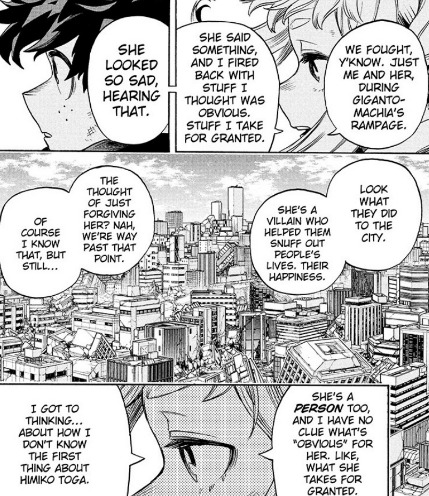
In fact Uraraka is actively trying to dehumanize Toga by looking at the destroyed city, so she won't have to think of Togaas a person.
The language here is also a major fault of this arc. It focuses far too hard on “forgiveness” over and over again. As I said before, saving Shigaraki isn’t about Shigaraki at all, it’s about Deku, and how he wants to use his power as a hero. Deku has even stated himself that he doesn’t believe that OFA is a power that should be used for killing people. So why does whether Toga or Shigaraki are forgivable or not even matter? It’s the same with Deku refusing Overhaul any sympathy. If he’s so morally opposed to abusers, then why does he work with Endeavor and defend him at every visible opportunity, even in front of his victims? Whether or not Deku can forgive Shigaraki doesn’t matter, because Deku is not the moral arbitrator or right and wrong. In fact Deku doesn’t even have any morals, so how is this a moral debate? Is there any point where Deku gives a clear definition of what he thinks right and wrong is? Does he quot Immanuel Kant to the audience?
Batman doesn’t kill people, not because he thinks that every last person on earth can be saved, but because Bruce Wayne an incredibly rich white man thinks that maybe he shouldn’t have the authority to decide who lives and who dies. When Bruce doesn’t kill the joker, it doesn’t mean he thinks the Jokers actions are forgivable, it’s because Bruce thinks it’s not his place to determine whether someone has the right to live.
The whole conflict that MHA presents us is that heroes pick and choose who to save, and only save the ones they deem as innocent. So, how does Deku saying repeatedly they can’t forgive Shigaraki contribute to that theme in any way? In fact by focusing on forgiveness, rather than whether or not he personally has the right to pick and choose who lives and who dies Deku is ignoring the elephant in the room. The question isn’t about whether Shigaraki’s redeemable or if his deeds should ever be forgiven. The question is whether Deku has the right to decide who gets saved and who doesn’t.
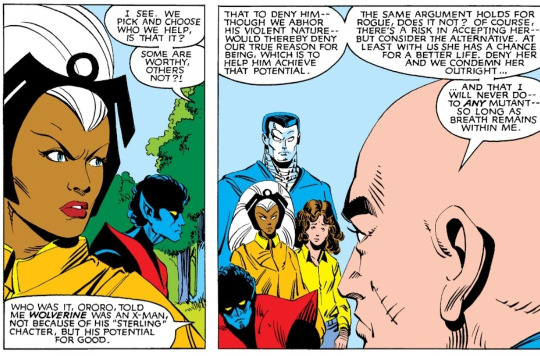
We are told that Deku as a character is someone who wants to save everyone no matter what, so Deku shouldn’t be focusing on whether or not Shigaraki is worthy of forgiveness, he should be making an idealistic argument like Xavier does in this panel. Why doesn’t Deku talk out loud with Uraraka on how he believes his power is for saving others, and not killing? If he’s meant to represent some idealistic hero, then why doesn’t he even talk about his ideals? Why don’t I as the reader know what those ideals are?
I think Xavier’s ideals of forcing the X-men to provide a good example to the mutant community, in order to try to earn the respect of other human beings is wrong, but at least he has ideals. He tries to inspire the other people around him to live up to those ideals. The story can criticize him for his ideals and point out how they’re wrong, while it can also uplift parts of his idelogy like where he believes there are no evil mutants. Deku has a chance to do the same to Uraraka, to tell her clearly, “I don’t think we as heroes have the right to pick and choose who we help…?” but he waffles. Not only does he waffle, but this moment is meant to be read as an indication that both Deku and Uraraka are sympathetic individuals who want to save their villains. They are supposed to look good and idealistic here and they don’t. For Deku it just seems like a repeat of his behavior with Overhaul. The only villains that are worthy of sympathy, are the ones that he personally decides are forgivable.
The story isn’t about whether or not it’s moral to save someone who’s killed as many as Shigaraki has. The story never seriously discusses any sort of complex morality or moral philosophy. Once again to bring up avatar, yes you can argue Aang sparing the life of a war crimminal is bad, but Aang mentions on multiple occasions that he wants to retain the cultural values of the airbending people. Aang has a morality, a consistent morality, it might not be a morality you personally agree with but at least he has one. Deku hates abusers, unless he’s next to Endeavor then he thinks abusers should be given the chance to atone. Deku doesn’t believe that One for All is a power for killing, but he never stands up to any of the adults who are blatantly trying to kill Shigaraki, he doesn’t even express out loud to Uraraka that he doesn’t think heroes have the right to decide who lives and who dies. In fact he’s given the perfect opportunity to, when Hawks kills a villain and it’s broadcast live on the news in font of everyone, but Deku never has anything to say about that. The reason Deku and Uraraka both put such an emphasis on “forgiving” their villains has nothing to do with the story itself. It’s because the author Horikoshi, is afraid that some people will misinterpret his story as saying that he actually thinks that saving a villain like Shigaraki means that he condones mass murder, so he has to have the characters talk about not forgiving Shigaraki.
Judai doesn’t have any consistent morals either, but once again that’s the point and something the story relentlessly calls him out on.
Cobra: Fortune would never smile on a fool like you who fights while prattling on about enjoying duels. Cobra: You are certainly a talented duelist. But you have one fatal flaw. Judai: A fatal flaw? Cobra: Yes, your duels are superficial. Someone who fights with nothing on his shoulders, cannot recover once he loses his enjoyment. What a duelist carries on his shoulders will become the power that supports him when he's up against the wall! Cobra: But you have nothing like that! Those who go through life without anything like that cannot possibly seize victory. Cobra: But I know that nothing I say will resonate with you... because you have nothing to lose but the match. Judai: I... Cobra: Afraid aren't you? Right now, you have nothing to support you.
Judai’s regularly called out for his superficiality. Judai is only a hero because he’s strong and wins fight, he doesn’t feel any responsibility towards other people, and in fact he loathes having to feel responsible for others. Judai isn’t just naive, he deliberately chooses to remain ignorant. Since he’s ignorant of his own faults, he makes awful decisions when it comes time for him to lead, and his friends die because of choices he made. We are told that Deku doesn’t want to remain ignorant, that he wants to understand villains, but Deku’s actual actions are him continuing to ignore society’s ills and the suffering of victims. In fact if you take away Deku’s internal monologue and the narration, Deku’s actions almost exactly mirror Judai’s.
Deku is just as superficial as Judai, and he also doesn't want to spend any time thinking about what kind of hero he wants to be, but the narrative never punishes him for it.
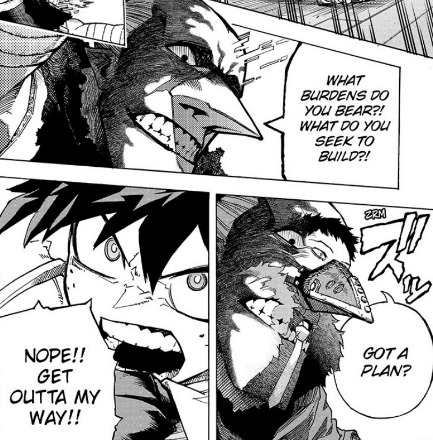
Judai is asked what burdens he has to bear and he has to meaningfull answer that question, Deku is allowed to get away with not having to think about anything. Deku remains superficial. Both Judai and Deku spend the entire arc running away from their villain rather than confronting them in any meaningful way. They both never express out loud any sympathy for their villain, or try to empathize. THey both never step down from the role of hero, and only confront their villain as a hero, because they don’t want to think about themselves as complicit or in the wrong. Shigaraki and Deku’s final confrontation mirrors Judai and Yubel’s but without the same clear framing. THe entire time Yubel is trying to get Judai to empathize with them, and Judai only responds with physical violence, because they don’t want to stop being the hero and because they can’t see Yubel as anything other than the villain. As soon as Deku arrives on the battlefield (by the way everyone else and their mom pointed this out, but Deku who doesn’t think OFA is a power for killing, is completely okay with a plan called the “Sky coffin plan” where every other hero was clearly trying to murder Shigaraki).
When Deku arrives he asks if Shigaraki is still in there, but he doesn’t do anything to try to reach Shigaraki, he jumps right to punching him. In fact he never tries anything besides punching him as hard as possible. How is punching Shigaraki with the force of a thousand suns saving him exactly? How is that different from how he tried to defeat Shigaraki the last war arc, before he saw the image of the crying child that made him want to try a different approach in saving Shigaraki? In Judai’s final fight with Yubel, it’s made explicitly clear that Judai is not trying to save Yubel, and that’s a fault on his part. In fact Judai gives the traditional “I have friends, and you don’t” speech to Yubel but it’s a subversion of how that speech is usually used. Usually that speech is used to show that the protagonist won because of they valued friendship,while the villain treated their friends poorly and only cared about power. However, it’s ironic in this case because Judai got all of his friends killed. Judai treats his friends like garbage. This speech isn’t used to show that Judai is winning because he values his friends more than Yubel does, it shows that Judai is a hypocrite, playing the hero in this situation where they are just as bad as Yubel. Judai’s not morally superior, he’s just lucky that he has good friends. Friends that were willing to save him. The only connection Yubel has to anyone else, Yubel’s only friend is Judai and Judai is a shit friend.
In fact, Mirio tries to give a version of the “You don’t have any friends” speech to Shigarkai, only for Shigaraki to get mad and tell Mirio that he does have friends and people he wants to protect.
This fact is also something that is blatantly ignored by Deku, even though Mirio tells him about it… even though we are told that Deku is trying his best to see the humanity in Shigaraki.
Judai blatantly admits they’re trying to kill Yubel. Which makes them a worse person, but a better character than Deku, because their actions are clearly framed by the narrative and consistent.
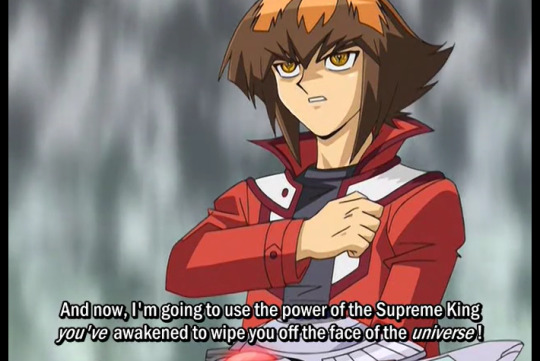
On the other hand we are told that Deku doesn’t want to kill Shigaraki, and yet everything Deku does makes it look like he’s just trying to kill Shigaraki and put him out of its misery. If we didn’t have Deku stating out loud that he wants to save Shigaraki and wants to see him as a human, there’d be nothing in his actions to indicate that he’s trying to avoid killing Shigaraki. Deku says he can’t pretend he didn’t see Shigaraki crying, but like, does he ever hesitate to punch Shigaraki, does he ever think that causing Shigaraki more harm is wrong when he’s already suffered so much? Deku says that Shigaraki is a person but does he treat him like a person? Does he try to talk to him like a person? To use avatar again, Aang does talk to Zuko pretty early on. Deku doesn’t even give the classic “We could have been friends under different circumstances” speech. When Shigaraki resists Deku’s attempts to see him as a person or emapthize with him, Deku’s response is to just resort to punching harder.
Which is in effect the same thing Judai does to Yubel, just kill them as a villain so they don’t hurt anybody else, but framed in an entirely different light. Judai is shown to be ruthless, and cold in his attempt to only settle the conflict with Yubel by violently putting them down. On the other hand we’re being told that Deku is compassionate and empathic while he punches Shigaraki with the force of a thousand suns.
There’s another eerie similarity between both of these final confrontations. At the climax of the confrontation, both Judai and Deku have a psychic vision where they see events from Yubel and Shigaraki’s childhood. This vision is supposed to help both characters understand the good in the villain they’re facing.
Let’s see the contents of this vision and how the visions change each character. Judai is shown a vision of his past life where Yubel sacrifices their entire body, and even their humanity to go through painful surgery to turn into an ugly dragon, all for the sake of protecting Judai in a previous life.
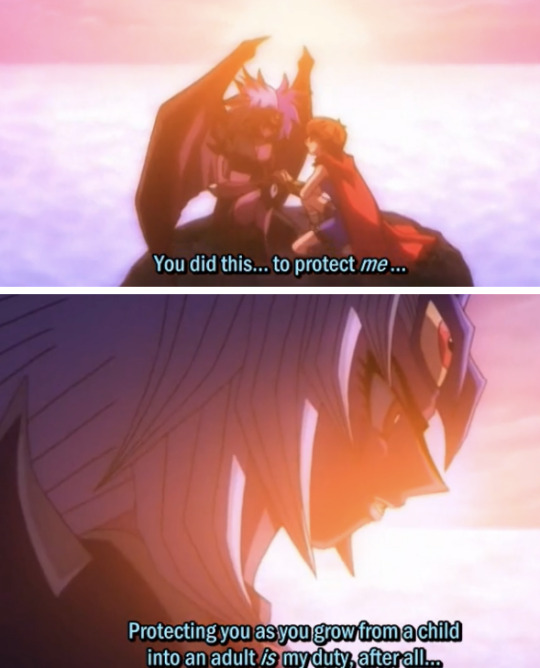
Judai is then forced to witness the good side of Yubel they’ve been ignoring all along to paint them as a villain. Yubel is simultaneously extremely selfish and willing to hurt people Judai cares about, but they’re also extremely selfless and will do anything to protect Judai and have made great sacrifices in the past for Judai’s sake. Deku gives lip service to not ignoring the humanity in Shigaraki, but Judai is literally forced to acknowledge the humanity in Yubel. Not only that, but Judai changes his behavior immediately after learning this new information. After seing the sacrifice that Yubel made for him in the past, Judai responds with a sacrifice of his own. A sacrifice that perfectly mirrors the sacrifice that Yubel once made for him. Yubel gave up their humanity for Judai, so Judai fuses his spirit to Yubel’s, becoming a human / spirit hybrid so Yubel no longer has to be alone.
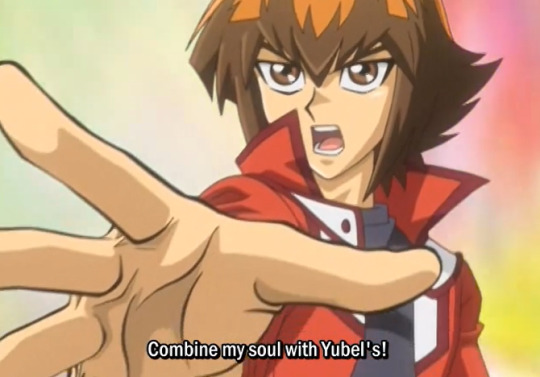
Judai also doesn’t just fuse their soul with Yubel’s in order to stop Yubel from destroying everything, it’s because both of them at this point need to atone together, and Judai is fulfilling his responsibility of watching over his friend until the end to prove that you care about them - as he said to Sho. Judai’s also fulfilling Johan’s dream of helping repair the bonds between spirits and humans, by reconciling with Yubel and repairing their bond. It’s also Judai atoning for his previous behavior of abandoning Yubel, by choosing to stay alongside them as they both atone together. Deku does sacrifice OFA during the fight against Shigaraki, but their sacrifice isn’t to help Shigaraki, but rather doing psychic damage to Shigaraki by using OFA is the only way to defeat them. He transfers OFA in order to break Shigaraki’s brain so he’ll stop reissting and Deku can beat him down. Judai fuses their soul together with Yubel out of empathy and a responsibility they feel to help their friend fater abandoning them, Deku transfers One for All to Shigaraki in order to hurt him and make him easier to punch. It's funny that Deku doesn't travel to Shigaraki's mind to learn more about him, but instead with the specific intent of harming him.
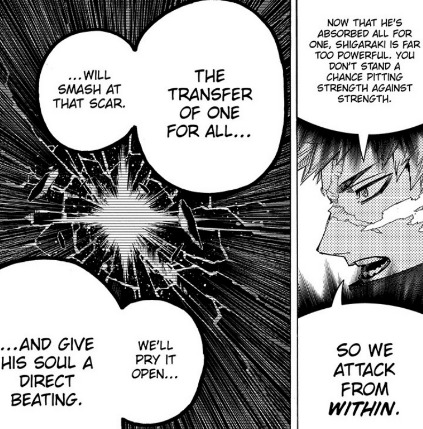
Once he's inside Shigaraki's mind, he doesn't take time to reflect on how Shigaraki used to stand up for bullied kids, or how he wants to be a hero to villains because no one else will stick up for the outcasts in society. No, he only care about Shigaraki when he takes the form of a child crying for help.
In the aftermath of the psychic vision Deku’s behavior doesn’t change towards Shigaraki in any way either. You could say he sacrificed his own arms in order to try to comfort Shigaraki within the depths of his own mind - but that’s not a real sacrifice either because his arms immediately come back. When Judai learns about the sacrifice that Yubel made in a previous life towards him, he stops seeing Yubel as an enemy and finds a way to resolve things peacefully between them. When Deku lanterns that Shigaraki’s a victim of All for One, and that his entire life was a lie, when he sees Shigaraki’s suffering first hand does his beavior twoards Shigaraki change in any way?
When he sees Afo has taken over Shigaraki’s body again, does he try to shout for Shigaraki, to tell Shigaraki to fight from the inside, to reassure Shigaraki that he’s still in there that there’s still good in him? Nope. He just punches Shigaraki some more.
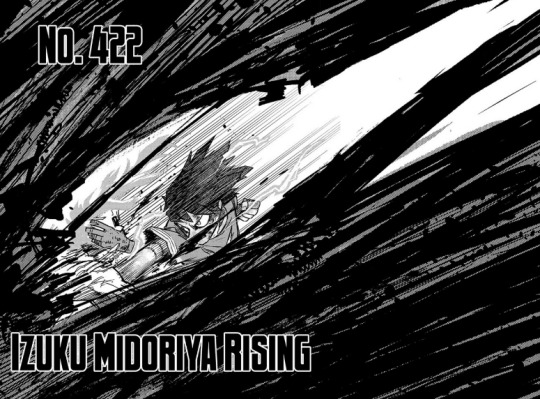
What Deku needed to tell Shigaraki is so obviously set up by the narrative too. Shigaraki wanted just one person in that house to tell him he could be a hero. Deku wanted his mother to tell him he could be a hero if he was quirkless. Deku sees that Shigaraki started out as a boy who wanted to be a hero, and who was manipulated into being a villain but does he try to appeal to the boy inside of Shigaraki by telling him he can still be a hero? Does he now see the good in Shigaraki? Nope, he just tries to kill him by punching him really hard.
I purposefully chose the images for the banner of this post, because it shows how differently MHA and GX treated its villains in the end. Yubel is embraced by Judai in the end, Shigaraki evaporates into dust.
"Judai, now that our souls have become one we will never be separated again. I have now been filled with your love and power. Let us fight together, against the wave of light leading this universe to destruction!"
Shigaraki could so easily have been given the love and empathy that Yubel was shown, but instead their life ends with no show of empathy from Deku, and with them dying believing that their long life of tragedy meant nothing in the end. Shigaraki realizes he's a crying kid, but he's never comforted.
Shigaraki: I only stole my body back from Master, and I didn't destroy anything. "In the end, I was just as you said... A crying kid, huh?"
Yubel is embraced and comforted, Shigaraki disintegrates into nothing.
One of these stories is apparently an optimistic story about heroes saving people, but it ends with the lifelong victim being killed in the most nihilistic manner possible, never receiving comfort, and never achieving anything with his long life.
The other story is a silly anime about card games, shows that when people are alone and suffering they can lash out and do terrible things. That all people are weak especially when they're alone, but the solution isn't to abandon them, or condemn them for their faults, but to believe in them and help uplift them the same way that Judai decides to uplift Yubel so they can atone together.
Which is why Deku gets an F in being a hero. Go directly to summer school. Do not pass Go. Do not collect $100.
#mha meta#ygo meta#mha 423#bnha 423#mha 423 spoilers#bnha 423 spoilers#izuku midoriya#deku#shigaraki tomura#tenko shimura#judai yuki#yubel#soulshipping#yu gi oh gx#yu gi oh
760 notes
·
View notes
Text
Let's talk about worldbuilding.
Worldbuilding is a crucial aspect of writing fiction, particularly in genres like fantasy and science fiction.
Remember that worldbuilding is a dynamic process that evolves as you write. Don't be afraid to experiment and make changes to your world as needed to serve the story.
Here are some tips to help you build a rich and immersive world:
Start with a Core Concept: Every world begins with an idea. Whether it's a magic system, a futuristic society, or an alternate history, have a clear concept that serves as the foundation for your world.
Define the Rules: Establish the rules that govern your world, including its physical laws, magic systems, societal norms, and cultural practices. Consistency is key to creating a believable world.
Create a Detailed Map: Optional, but helpful. Develop a map of your world to visualise its geography, including continents, countries, cities, and landmarks. Consider factors like climate, terrain, and natural resources to make your world feel authentic.
Build a History: Develop a rich history for your world, including key events, conflicts, and historical figures. Consider how past events have shaped the present and influenced the cultures and societies within your world.
Develop Cultures and Societies: Create diverse cultures and societies within your world, each with its own beliefs, traditions, languages, and social structures. Explore how different cultures interact and conflict with one another.
Flesh Out Characters: Populate your world with memorable characters who reflect its diversity and complexity. Consider how their backgrounds, motivations, and personalities are shaped by the world around them. (See my post on character development for more!)
Consider Technology and Magic: Determine the level of technology and the presence of magic in your world, and how they impact daily life, society, and the overall narrative.
Think about Economics and Politics: Consider the economic systems, political structures, and power dynamics within your world. Explore issues like inequality, governance, and social justice to add depth to your worldbuilding.
Show, Don't Tell: Instead of dumping information on readers, reveal details about your world gradually through storytelling. Show how characters interact with their environment and incorporate worldbuilding seamlessly into the narrative.
Stay Consistent: Maintain consistency in your worldbuilding to ensure coherence and believability. Keep track of details like character names, historical events, and geographic locations to avoid contradictions.
Leave Room for Exploration: While it's essential to have a solid foundation for your world, leave room for discovery and exploration as you write. Allow your world to evolve organically and be open to new ideas and possibilities.
Revise and Edit: Carefully review your worldbuilding to identify any inconsistencies, plot holes, or contradictory elements. Pay attention to details such as character backgrounds, historical events, and the rules of your world's magic or technology. Make necessary revisions to resolve any issues and maintain the integrity of your worldbuilding.
Happy writing!
Previous | Next
#writeblr#writing#writing tips#writing help#writing resources#writing advice#worldbuilding#fantasy worldbuilding#creative writing#deception-united
1K notes
·
View notes
Text
So, to get serious for a moment. If you've been following me for a while you're surely aware of how bad Javier Milei's government is for our country and in particular for science and education. This has affected me very personally, as the recent funding cuts mean I'm basically unemployed right now. This is an undesirable situation to say the least, and because of the general crisis we're going through that affects virtually all institutions in the country, my job search is not easy.
This means I might have to move away soon, perhaps to another province or country, if I cannot find a job here, which is a huge expense I must consider and save for. And also, my family is going through legal expenses (nothing bad, but still a money sink) and I am unable to help them right now. Along with many other expenses that get worse every week (not an exaggeration) given our current economic crisis. So right now, I'm looking for any kind of income until hopefully I can get a stable job.
I would really appreciate if you could consider supporting me on Ko-Fi, even a little bit means a lot here on Argentina. And I want you to get something out of it! If there's something my years of study have been useful for, is to learn about how the world works, and if you know my passion for worldbuilding and love the things I write about it, please, do feel free to ask me questions, suggest me things to write about, or DM me to talk about your writing. I often take my time to answer, but if there's anything I have now, it's unfortunately time. So I hope you consider supporting me, and regardless, you can look forward to more worldbuilding, science and history posts. And Argentina shitposting of course.
In a more professional note, I am also a certified and experienced English-Spanish translator. If you're seriously looking for someone with that skill, you can DM me.
So, that's it. Thank you for reading.
702 notes
·
View notes
Text
Sri Lankan Fairies and Senegalese Goddesses: Mixing Mythology as a Mixed Creator
[Note: this archive ask was submitted before the Masterpost rules took effect in 2023. The ask has been abridged for clarity.]
@reydjarinkenobi asked:
Hi, I’m half Sri Lankan/half white Australian, second gen immigrant though my mum moved when she was a kid. My main character for my story is a mixed demigod/fae. [...] Her bio mum is essentially a Scottish/Sri Lankan fairy and her other bio mum (goddess) is a goddess of my own creation, Nettamaar, who’s name is derived from [...] Wolof words [...]. The community of mages that she presided over is from the South Eastern region of Senegal [...] In the beginning years of European imperialism, the goddess basically protected them through magic and by blessing a set of triplets effectively cutting them off from the outside world for a few centuries [...] I was unable to find a goddess that fit the story I wanted to tell [...] and also couldn’t find much information on the internet for local gods, which is why I have created my own. I know that the gods in Hinduism do sort of fit into [the story] but my Sri Lankan side is Christian and I don’t feel comfortable representing the Hindu gods in the way that I will be this goddess [...]. I wanted to know if any aspect of the community’s history is problematic as well as if I should continue looking further to try and find an African deity that matched my narrative needs? I was also worried that having a mixed main character who’s specifically half black would present problems as I can’t truly understand the black experience. I plan on getting mixed and black sensitivity readers once I finish my drafts [...] I do take jabs at white supremacy and imperialism and I I am planning to reflect my feelings of growing up not immersed in your own culture and feeling overwhelmed with what you don’t know when you get older [...]. I’m sorry for the long ask but I don’t really have anyone to talk to about writing and I’m quite worried about my story coming across as insensitive or problematic because of cultural history that I am not educated enough in.
Reconciliation Requires Research
First off: how close is this world’s history to our own, omitting the magic? If you’re aiming for it to be essentially parallel, I would keep in mind that Senegal was affected by the spread of Islam before the Europeans arrived, and most people there are Muslim, albeit with Wolof and other influences.
About your Scottish/Sri Lankan fairy character: I’ll point you to this previous post on Magical humanoid worldbuilding, Desi fairies as well as this previous post on Characterization for South Asian-coded characters for some of our commentary on South Asian ‘fae’. Since she is also Scottish, the concept can tie back to the Celtic ideas of the fae.
However, reconciliation of both sides of her background can be tricky. Do you plan on including specific Sri Lankan mythos into her heritage? I would tread carefully with it, if you plan to do so. Not every polytheistic culture will have similar analogues that you can pull from.
To put it plainly, if you’re worried about not knowing enough of the cultural histories, seek out people who have those backgrounds and talk to them about it. Do your research thoroughly: find resources that come from those cultures and read carefully about the mythos that you plan to incorporate. Look for specificity when you reach out to sensitivity readers and try to find sources that go beyond a surface-level analysis of the cultures you’re looking to portray.
~ Abhaya
I see you are drawing on Gaelic lore for your storytelling. Abhaya has given you good links to discussions we’ve had at WWC and the potential blindspots in assuming, relative to monotheistic religions like Christianity, that all polytheistic and pluralistic lore is similar to Gaelic folklore. Fae are one kind of folklore. There are many others. Consider:
Is it compatible? Are Fae compatible with the Senegalese folklore you are utilizing?
Is it specific? What ethnic/religious groups in Senegal are you drawing from?
Is it suitable? Are there more appropriate cultures for the type of lore you wish to create?
Remember, Senegalese is a national designation, not an ethnic one, and certainly not a designation that will inform you with respect to religious traditions. But more importantly:
...Research Requires Reconciliation
My question is why choose Senegal when your own heritage offers so much room for exploration? This isn’t to say I believe a half Sri-Lankan person shouldn’t utilize Senegalese folklore in their coding or vice-versa, but, to put it bluntly, you don’t seem very comfortable with your heritage. Religions can change, but not everything cultural changes when this happens. I think your relationship with your mother’s side’s culture offers valuable insight to how to tackle the above, and I’ll explain why.
I myself am biracial and bicultural, and I had to know a lot about my own background before I was confident using other cultures in my writing. I had to understand my own identity—what elements from my background I wished to prioritize and what I wished to jettison. Only then was I able to think about how my work would resonate with a person from the relevant background, what to be mindful of, and where my blindspots would interfere.
I echo Abhaya’s recommendation for much, much more research, but also include my own personal recommendation for greater self-exploration. I strongly believe the better one knows oneself, the better they can create. It is presumptuous for me to assume, but your ask’s phrasing, the outlined plot and its themes all convey a lack of confidence in your mixed identity that may interfere with confidence when researching and world-building. I’m not saying give up on this story, but if anxiety on respectful representation is a large barrier for you at the moment, this story may be a good candidate for a personal project to keep to yourself until you feel more ready.
(See similar asker concerns here: Running Commentary: What is “ok to do” in Mixed-Culture Supernatural Fiction, here: Representing Biracial Black South American Experiences and here: Am I fetishizing my Japanese character?)
- Marika.
Start More Freely with Easy Mode
Question: Why not make a complete high-fantasy universe, with no need of establishing clear real-world parallels in the text? It gives you plenty of leg room to incorporate pluralistic, multicultural mythos + folklore into the same story without excessive sweating about historically accurate worldbuilding.
It's not a *foolproof* method; even subtly coded multicultural fantasy societies like Avatar or the Grishaverse exhibit certain harmful tropes. I also don't know if you are aiming for low vs high fantasy, or the degree of your reliance on real world culture / religion / identity cues.
But don't you think it's far easier for this fantasy project to not have the additional burden of historical accuracy in the worldbuilding? Not only because I agree with Mod Marika that perhaps you seem hesitant about the identity aspect, but because your WIP idea can include themes of othering and cultural belonging (and yes, even jabs at supremacist institutions) in an original fantasy universe too. I don't think I would mind if I saw a couple of cultural markers of a Mughal Era India-inspired society without getting a full rundown of their agricultural practices, social conventions and tax systems, lol.
Mod Abhaya has provided a few good resources about what *not* to do when drawing heavily from cultural coding. With that at hand, I don't think your project should be a problem if you simply make it an alternate universe like Etheria (She-Ra and the Princesses of Power), Inys (The Priory of the Orange Tree) or Earthsea (the Earthsea series, Ursula K. Le Guin). Mind you, we can trace the analogues to each universe, but there is a lot of freedom to maneuver as you wish when incorporating identities in original fantasy. And of course, multiple sensitivity readers are a must! Wishing you the best for the project.
- Mod Mimi
#asks#multiracial#multicultural#south asian#sri lankan#senegalese#west african#identity#representation#worldbuilding#fantasy#mythology#folklore#fairies#deities#adoption#identity issues#mixed experiences#coding
638 notes
·
View notes
Text
Clan Culture Illustrations
So I've been mentioning this in passing, and I think now is a good time to start collecting info from people who are interested!
I'm seeking artists who want to draw stuff for my Clan Culture series.
I often write very large guides for things like tools, ecology, medicine and treatments, etc, which then get held up by the fact that they're big blocks of text without any fun pictures. I usually collaborate with friends and family, but I could put out more quicker if I had some artists on standby.
If you're an artist who would be interested in illustrating, here's the details;
Everything I make on this blog is tailored towards WC fans, but free for anyone to use and reference for their xenofiction worldbuilding projects. You do not have to be intimately familiar with the Warrior Cats books. This offer's open to anyone above 18.
Fans of Better Bones are preferred, because Clan Culture and BB often intersect. I might ask for help with some BB stuff at some point, too. (for example i have a guide on types of StarClan spirits that needs illustration)
To re-iterate, please only inquire if you're 18+
Price range is 20 - 50 USD and turnaround time can be up to 6 months if you just keep me updated. (I am sorry that I can't offer a higher price for these, but this is coming from my own pocket. In return, this is meant to be low pressure)
Half payment upfront, the rest after completion.
I will never "assign" you a surprise mystery topic (unless you ask for that I guess?), I'll either present you with a list of posts that need illustration (yes this means you get to read stuff early), OR float some ideas that play to your strengths and interests. (for example: if I'm approached by Spider-Enjoyer-9000 who's willing to draw a ridiculous number of spiders, I will draft, write, and research a Clanmew Expansion in the style of Deer and Co or Moths and Butterflies.)
Either way, there's usually a lot of creative freedom here unless I need a specific technical drawing, which I will discuss with you and provide references for. (As an example, if we were talking about a post on declawing, I might ask for you to illustrate the muscles within the paw.)
The nature of Clan Culture means you will probably be asked to draw plants, food, objects, and/or scenery
Still interested?
I'm hoping to make a personal "list" of people I can call on, so send me your commissions info or details in a DM, an ask, a reply to this post, or anything else you'd like. Tell me about stuff you like drawing, topics you're interested in, if you can draw backgrounds, etc
Also, please tell include in that message if you're comfortable with illustrating these particular sensitive topics. These are opt-in only;
Medical Gore (Woundcare, stitching, blood, vomit, urine, parasites and bug bites, etc.)
Reproductive Care (Abortion, birth, pyometria, inducing lactation, possible revamp of the HRT guide including simple surgeries, etc)
Hunting and Butchery (Humane killing of prey, skinning, disembowelment, cutting meat, making sausage and blood pudding, etc)
Funerals and Animal Death (Sad kitties, dead battle cats, scavengers and grave desecration, tombs and burial rituals, concealing decay, etc.)
The end art will always stay tasteful, but I might need to give you references in the form of real images or tutorials that might be upsetting if you're sensitive to these topics-- so it's important to me that I consider those four things "opt-in."
I have plenty of other posts that need illustration, it's just a huge plus if you're able to do these too.
(You should also mention any other specific triggers or phobias you have, so I don't unwittingly come at you with something else upsetting)
"I still have questions!"
Putting a big list of answers beneath the cut;
"Would everything have to be colored?"
Nope, as long as there's pictures to break up the text, you can do sketches, black and white, flat colors, only put color in the header, etc. We'll discuss expectations with the post in front of us, and then agree on price.
I have ONE requirement; it's gotta look good on Tumblr darkmode. Because I use Dark Reader.
"Do you have a Discord?"
I do, I just try to be exclusive with who I give it to! When we're discussing details, we'll probably move over there if you'd like. This is a reason why I only want to work with 18+ artists, I'm not always SFW on main.
"Can we do an entry together about (specific topic)?"
Probably yes, so feel free to ask! The worst that will happen is that I say no, or maybe later. For example, I've got a post on Sweetness Tolerance reserved for my partner (they like to draw sweets), so I would say no if you asked.
Just keep in mind that researching, outlining, and writing is unpaid labor I'm doing completely for free. I have posts mostly done that just need art, and topics I've done some research on. Please only ask for special collaborations from scratch if you're serious 🙏
"Does it have to be digital?"
You'd have to have a WILD idea for me to say yes to anything non-digital, but I am a queer of whimsy. If you can whimsify me with an idea, hell yeah.
"Will I be compensated if you need any changes?"
Yes. If I spring anything on you after the details we agree on, I will first ask you, then ask how much that change would cost, and then compensate you for it.
As fair warning though, I am trying to stay within a budget and writing the posts themselves is unpaid work I do (plus occasional helping hands during research stages, I consulted a friend who is an irl wetlands expert for ShadowClan's environment). I can't pay more than what we agree on.
"Can I link my info in the post?"
Yes. "Guest Artist" is going to be named in the opening paragraphs, along with any fundraiser, shop info, carrd, etc, you want there.
"Boosty?"
Yea I got Boosty. Paypal, too.
"I have some other question about pricing"
Feel free to ask, but my hard budget is 20$ - 50$ US. Please only inquire if you're willing to charge within that range.
"What if I'd do it free or I want to do this anonymously?"
I'll donate to a charity of your choice and link to it in the post. If you have no charity preference, I will link to RAINN, Anera, or The Trevor Project.
(Naturally this comes with an anti-ghoul caveat or two. If you try to get me to donate to something like Autism Speaks I will rotate every bone in your body by 45 degrees.)
"I like checklists, can you give me a checklist of info you want in a DM?"
Sure!
Your info; socials, carrd, shop, etc
General interests and strengths. Stuff you'd love to work on, or have insight to. If you like fishing or drawing bugs, I want to know that. If you particularly want to practice flowers, tell me. Be as detailed as you want so I can pair you with a relevant subject!
Your examples
General asking price (or charity)
Which, if any, of the four Opt-In Subjects you're opting in for.
Anything else I should know (triggers, phobias, things you dislike drawing, if schooling or disability means you need a particularly long turnaround time, etc)
#bone babble#If other questions pop up I'll add em slowly#Seeking commissions#Clan Culture#This would probably start up in a couple of weeks but collecting this info now is useful#If you're curious-- right now there's a HUUUGE one on Shadow's cultural overhauls#A really old one on flax processing that needs to be rewritten#One about parasites. Another on spiritual entities.#And a plan to answer like 30 individual asks by wrapping them all up in Woundcare 101#My ask count is close to 3k btw
165 notes
·
View notes
Text
Chapter Progress [NOV/06]
Hey all, it's been a while since I've written one of these 🍂
I've been posting regular previews on my Patreon, but a proper update was long overdue! As a refresher, my last update was this one, and I've got lots more to update you on now that I'm further along!
I've struggled a lot with this chapter and have been trying to wrangle it into shape as best I can, and I'm happy (and relieved) to say that I can finally give you an estimated release date: you can expect CH12 to be uploaded in December this year.
I won't be putting a specific date on it yet, since it could be anywhere from early December to late December depending on how much progress I make in November, but I'll let you know! Now, onto specifics.
The Main Plot
I'm currently balancing out LI specific content in the main plot! Regardless of what you chose in regards to Kham and the peri trader, players will be spending some time with D and X to make up for their absence in CH10 at the beginning of this chapter, and I've really missed writing their dynamic with each other as well as the Crown.
I genuinely can't decide which branch is my favorite. Meeting with Kham directly gives so much juicy verbal sparring and tension between not only her and the Crown but her and D and X as well. But meeting directly with the peri trader let me dig more into the worldbuilding, explore the city a bit, and have some more lighthearted shenanigans with D and X too.
I'll add some previews here for both routes that I've also already shared for people on the Patreon. Here's a little excerpt for people meeting with Kham:
“There is one thing I have been wondering, princess,” you say as you stare back into her eyes, watching the way the orange orbs of light flicker like flames. “When you first arrived here, you were accompanied by a retinue of guards. Whatever happened to them?” Kham does not raise her brows at you, exactly, but something similar to the motion as the wood above her eyes arches upwards with a stiff creaking sound. “They are not merely my guards, they are my servants first and foremost. Naturally, they run errands for me.” “What kinds of errands?” “Surely you do not think I would fetch all I require by myself?” She appears amused by the line of questioning rather than offended. “They trade with the peri merchants in your city on my behalf. Although, calling it trade is perhaps not accurate, as I hold the right to lay claim on their supplies whenever I please. They are representatives of my mother, after all.” You consider the explanation, but nothing about it seems notable or inconsistent so far. “So you have never dealt with this peri trader I wish to meet with yourself?” “Of course not.” She smiles, her wooden mouth briefly pressing together. “That would be beneath me.” “A shame,” $xname muses casually from beside you, contrasting the sharp look in their eyes. “We had hoped you might have some insight to share.” “As much insight as you are willing to offer me regarding this flower you seek,” Kham returns, her smile still in place. “The blue siren, yes? A rather strange fixation…” You feel the urge to tense, but withhold yourself from it by taking a slow, relaxed breath. All the rigorous physical training you have underwent over the course of the past month is already showing its benefits: you feel more aware and in control over your body, able to maintain your composure. A necessary skill when dealing with someone like Kham, as conversing with her feels like a dance of sorts. The two of you are watching each other’s steps, waiting for the other to slip.
And here's the excerpt for if you choose to meet with the peri trader:
You manage to make it through the marketplace, finally arriving at a large building with an open front, wrapping around the corner of the street. Tables and shelves are lined with various flowers and plants, perused by a few passing customers. This appears to be the peri trader’s shop, signaled by the sign at the front that reads Eshkar’s Garden. Eshkar being the name of the peri trader in question. Most of the flora on display you recognize, if not by the labeled names then by sight alone, but several look entirely new to you. Pale white flowers whose hanging bulbs pulse with light when a customer brushes against its leaves; bleeding vines wrapped around a miniature roofed trellis atop a tall table, its crimson flowers slowly dripping down pink juice caught by bowls below; a tall flower with only two black petals, large and pointed, that nearly startle you when they snap together several times in sharp, cracking sounds, almost as if the flower were clapping. IF CROWN IS INTELLIGENT Momentarily forgetting about your intended purpose in being here, you approach the clapping flower with curiosity, wondering what set it off. Sure enough, you see dead and decomposing flies of various sorts collected at the center of its bulb as you lean over to peer inside, taking care to avoid leaning in too close lest your nose get caught between the aggressive petals. Does it catch and eat small insects? How fascinating. You glance at the labeling of the flower, its name fittingly given as ‘black ovation’. IF CROWN IS INTUITIVE Eyes drawn by the visual spectacle of the white flowers, you find yourself wandering over to its shelf, glancing at the labeling that reads ‘stardrops’. The bulbs look ordinary at first glance, but sure enough, when you reach out to touch its petals, the flower begins to glow like you saw before. A ring of light travels up its stem, through the petals to the very ends, where it erupts into tiny little golden sparks. Hence the name, you suppose. Unable to stop yourself, you touch the flower again, mesmerized by the light show, until you notice a shop attendee frowning at you from nearby. Feeling scolded, you quickly pull your hand away and offer an apologetic smile.
Lots of fun going on in both routes! I don't envy you for having to make this choice lol.
Aside from this big branch, the main plot will converge for everyone again in the latter half of the chapter, where the Crown gets do to some more typical Crown things: hearing public petitions! They'll contain 2 smaller scenes where your character will hear out some citizen concerns, which will let you rack up reputation points with either the public or the nobility, and 1 major scene that affects a future plot point.
Not gonna spoil these since I've already talked so much about everything else regarding this chapter, so this will have to remain a surprise ✨
The Romances and Friendships
While the start of the chapter is X and D focused, if you have a specific (platonic) LI you want to spend more time with as buddies and perhaps get a little relationship advice, you'll have that opportunity at the start of CH12! I've had to write 12 variations in total for each friendship scene, which was a lot of work, but completely worth it.
Some LI routes also have big additional differences depending on if you have a low or high romance (such as A and R), while it matters a little bit less for the others for the time being (such as D and X). So if you screwed up on D or X's romances and have a low status, you're mostly in the clear from immediate consequences… for now.
Here's a little excerpt, taken from a playthrough of a Crown who has a high romance with A and chooses R's friendship scene:
Something like mischief gleams in $rname’s eyes as $rthey looks at you. “I’ve noticed you and $aname seem especially close nowadays.” You shift a little on the couch, averting your gaze to avoid $rname’s eyes as you strike a casual tone. “Do we?” “Mhm.” When you do glance over at $rname, you find $rthem studying $rtheir nails, and you begin to relax as you think it was just an idle remark. Until $rthey adds, “All the hand-holding underneath the table is endearing, I must admit. Especially since the two of you seem to think you’re being subtle about it.” IF CROWN IS RESERVED Heat flushes up your neck at being seen through so easily, remembering breakfast earlier that morning where $aname’s fingers hooked around yours beneath the table. “We were just… we’re not…” $rname looks up from $rtheir nails to grin at you. “There’s no need to look so embarrassed! I’m happy for you. The two of you seem well-suited for each other.” Trying to move past your flustered state, you clear your throat. “You think so?” “I’ve never seen $aname so at ease as when you’re around,” $rname considers, eyes narrowing with teasing and fondness both. “You look more unburdened with $athem near, as well.” IF CROWN IS FLIRTATIOUS You almost laugh at the remark and give it away completely, only managing to keep it in at the last moment and grinning back at $rname instead. “I have no idea what you’re talking about.” $rname looks up from $rtheir nails with a sly smile. ��No? What a shame. I was going to say how well-suited the two of you are for each other.” That catches your attention, your playfulness easing into something more sincere. “Really?” “I’ve never seen $aname so at ease as when you’re around,” $rname considers, eyes narrowing with teasing and fondness both. “You look more unburdened with $athem near, as well.”
This scene aside, CH12 will also contain another dedicated romance scene with your LI, dealing with some of the fallout from last chapter whether good or bad. If your romance is high, you'll be coasting- except maybe for D romancers, who are in Pining Hell either way haha.
If your romance is low, though, prepare for some delicious angst 🙏🏼
That's all I've got for now! Thank you all so much for your patience and support as always, especially for how long I've been making you all wait. You're the best 💖
291 notes
·
View notes
Note
Can you please give me tips on how to develop a magic system? If you've already written the tips, just send me a link to the post. Here's what I have so far:
There are seven forces of magic, namely, Passion, Desire, Joy, Hope, Trust, Clarity, and Love. To use magic, you must channel at least two of the forces. I don't really have anything beyond that.
How can I flesh this out?

Questions For Developing A Magic System
Hello! Thanks for the question. Here are some related posts to your question: Magic System Ideas, Writing Magic Systems, Writing Magicians - the basics
That said, I’ll flesh out some of my ideas based on the information given in your question. Here are some questions you can use to make the magic system specific:
What is the effect of the magic? Generally, magic will either be destructive or constructive or both. Is the purpose of your magic to make a person feel the corresponding emotions?
Does one person have only one type of magic, forcing your characters to work together?
Also consider how you’re going to differentiate the different type of magic – through the use of color, the physical appearances of the different types of magicians, different symbols, different ways of activation, etc.
Do the different type of magic users like or dislike each other in general?
Can this magic be learned, or must one be born into it?
If the magic must be learnt > competitive schooling/training for aspiration magicians, unlocking different “levels” of a type of magic, is it common or rare or people to be able to use
If the magic is born into > discrimination between magical vs. non-magical people, conflict between “superior” and “non-superior” forms of magic, etc.
I think a magic system (apart from being a part of worldbuilding) must provide the basis for interesting conflict. Think about how you can make use of the characteristics of your magic system to pull the plot through a main conflict and back to resolution.
For example,
There are “good” combinations of the seven magical forces and “bad” combinations that would cancel each other out…or worse. Magicians with different types of magic either alley with each other or have long-standing beef based on how “friendly” their magic forces are to one another.
The seven types of magic are tiered. Some magicians monopolize power and inherit it throughout generations – until the hero comes along.
Enemies-to-lovers dynamic where the hero and heroin have to work together because they’d be useless on their own.
You can also consider what your magic system means for us in the real world. All of your magic types are emotions. Is the ultimate moral of the story that we must be willing to embrace conflicting emotions rather than just chasing happiness? Or that every one of these is equally valuable?
Magic systems can be satirical.
Magic systems can be a twisted version of a real-life social/governmental/corporate system, often to critique the real world.
─── ・ 。゚☆: *.☽ .* . ───
💎If you like my blog, buy me a coffee☕ and find me on instagram! Also, join my Tumblr writing community for some more fun.
💎Before you ask, check out my masterpost part 1 and part 2
#writers and poets#writing#writeblr#helping writers#writers on tumblr#poets and writers#creative writers#creative writing#resources for writers#writers community#writers life#writerscommunity#write every day#write it#write anything#writers#magic#fiction#fantasy#magic system
142 notes
·
View notes
Text
the thing that makes me so interested in a crossover between these three specifically is how Sing, Zootopia, and Beastars are all set in a world of anthropomorphic animals, but they can't be the same world because small differences make them fundamentally incompatible. obviously Beastars takes place in a world where cannibalism is a Thing and the politics are completely different, but Sing also has species types (namely reptiles and primates) that Zootopia doesn't, and Zootopia's world has reached a level of peace and prosperity that Beastars definitely hasn't.
off the top of my head, some of the most meaningful differences are:
-in Zootopia, the city is built to accommodate all types of animals with various heights, weights, shapes and sizes. in Sing, the city is built with a "one size fits all" mindset and forces non-standard animals like Mike (a mouse) and Moon (a koala) to compensate. In stark contrast, the school in Beastars forms its architecture around species segregation, and the "one size fits all" approach is only used in public spaces with lots of traffic.
-speaking of sizes, Zootopia has animals that are accurately sized and proportioned to real life, while Sing and Beastars have relatively scaled down versions (e.g Meena the elephant only reaching the height of a tall human). Beastars in particular seems to be base heights entirely based on vibes--dogs seem to be human height, snakes can be tiny or huge, and even small animals are frequently sized up to the height of a smallish child.
-Sing and Beastars also have far more humanoid characters in comparison to Zootopia.
-species that exist are super varied. in Zootopia, it's strictly regulated to mammalian herbivores and carnivores with occasional omnivores like raccoons and otters. in Beastars, there are mostly mammals but domestic animals like dogs and chickens are included. in Sing, pretty much anything goes - gorillas, koalas, chickens, dogs, sheep, snails, and what have you.
-the predator/prey relations. Zootopia has tense societal drama between predator and prey but individuals can coexist just fine - the fear is always there, but generally the violence of the wild is comfortably behind them. Beastars features a much sharper divide between predator and prey species due to the very real presence of cannibalism, and the fragile peace between carnivores and herbivores always feels ready to snap. meanwhile, Sing doesn't have any species-related conflicts whatsoever and there's no word on whether they ever existed.
so if you hypothetically wrote something where the characters of one of these stories fell into the world of another, it would make really interesting dynamics - and those dynamics would change based on which world is the main setting. sending Nick and Judy into the Beastars world would force them to confront even worse prejudice (and prompt some meta, considering the original concepts present in Zootopia's plot), but sending them into the Sing world would give them whiplash because there aren't any species-based prejudices AT ALL. meanwhile, sending Haru and Legoshi into the Zootopia world wouldn't be a big deal because wolves and rabbits exist there, while sending Johnny and Ash into the Zootopia world would cause tons of problems because Zootopia's world has never seen gorillas or porcupines.
i can think of so many scenarios for this. imagine Nick and Louis, two characters who have defined themselves by societal expectations of their species, falling into Sing's world and being gobsmacked that the bigoted worldviews and ugly stereotypes they've struggled with all their lives simply don't exist. imagine Judy falling into the Beastars world and, while trying to get home, valiantly tries to smooth over the predator/prey conflicts she comes across, only to slowly figure out just how violent and depraved the world is compared to hers. imagine Meena falling into the Beastars world and seeming like a giant, or falling into the Zootopia world and looking way too tiny compared to the other elephants. i spent way too long thinking about this but you get it right
having been lying in bed sick all day, i've had many strange things on my mind over the course of the past 12 hours and yet the only topic that interests me now is the ramifications of writing a crossover between Beastars, Zootopia, and Sing.
#i spent waaaaaaay too much time on this post#it's not even that i want to write this. i don't. i just love noodling over the implications of the premise#because it's just - interesting! it's really interesting to look at a setting as common as “anthro animal universe”#and note the small but pronounced differences between them#all three of these are set in a world of furry animals but it's not the SAME world#and they all have slightly different worldbuilding that would throw the characters off-guard if they encountered it#since i'm sick i get to consider the political societal and narrative ramifications of this crossover. as a treat#sage speaketh#sing#zootopia#beastars#au tag#tw: cannibalism#tw: violence mention#edited for your convenience#(<-fixed the section ab animal sizes bc it turns out i was wrong about the scales of beastars)#(in my defense i haven't seen it in years and all the memorable characters are human sized)
13 notes
·
View notes
Text
Which Star Trek series should you start with?
The Original Series: Advantages: + The one that started it all + Has some sophisticated and socially conscious science fiction that has held up exceptionally well + The lead characters all have really good chemistry and fun to see play off of one another + It's what most people probably think of when you say Star Trek (together with TNG) Disadvantages: - It can feel very dated and kind of sexist, particularly in its treatment of women - The sci-fi and social commentary may have held up, but damn it, the special effects really haven't - When TOS is bad, it's really, really bad.
The Animated Series: Advantages: + Basically just more TOS. Disadvantages: - Basically just more TOS, but substituting extremely cheap animation for bad special effects
The Next Generation: Advantages: + Probably the most popular one at this point + The crew is full of interesting characters and they're fun to spend time with + Just really smart people solving Space Mysteries + Socialist space utopia + Geordi-And-Data! + Lots of cool sci-fi concepts and social commentary + It's what most people probably think of when you say Star Trek (together with TOS) Disadvantages: - Although not in the same way as TOS, it can feel dated at times, particularly in terms of its treatment of women and it's near complete refusal to acknowledge queerness - Without wanting to bias viewer opinion, the first season is widely considered to be pretty bad - The series makes no bones about the fact that the socialist space utopia is better than every other society that has ever existed and will reiterate this point over and over again
Deep Space Nine: Advantages: + The most popular Trek series on Tumblr + Has a complete story arc, as well as arcs for all of its characters, including the extremely minor ones + Plain, simple, Garak. The humble tailor. + Garashir, if you're into that + Seriously has a really sophisticated treatment of things like post-colonial politics, anthropology, worldbuilding, and the horrors of warfare + Just the characters in general + Is the only Star Trek prior to the 2010s to even look meaningfully at queer representation Disadvantages: - Has an absolutely massive inferiority complex with respect to TNG and this drives a few poor writing decisions that seemingly exist just to poke the Socialist Space Utopia in its eye - Introduces a space religion and then just slowly turns it into Christianity with the numbers filed off - Seems to think that sexual harassment is just a quirky eccentricity - There's no women in its writers' room, and frankly it shows
Voyager: Advantages: + Probably the clearest instance of found family in space + Lots of really good episodes + Lots of fun new characters + Strong female role models + "Set a course...for home." Disadvantages: - Continuity? I never knew her! - Probably about 90% of Trek's reputation for technobabble comes from this one series - Even less queerness than TNG. - Only like...3 characters actually get arcs. - The first few seasons lean very hard into bullshit fake "Native American" spiritualism with one of the characters - How do these guys have warp drive but can't find any water?
Enterprise: Advantages: + Chronologically the first series + 90% less technobabble + The only series to plausibly frame our heroes as astronauts...on some kind of...star trek. + Still has probably the best production values of any series + Makes alien cultures of the week feel somehow richer and deeper than other series + Faith of the Heart is good, fuck you. Disadvantages: - Oh my god, the decon scenes - Seriously, if you've ever wondered what a "sexy" series written by a 14 year old boy who's only ever seen a bit of scrambled softcore porn on late-night cable would be like, this is the show for you - Somehow feels more sexist and racist than the show from the '60s - Seriously, the POC characters mostly exist to fill seats on the bridge; the women constantly have to undress themselves - Hellooooo, Bush II-era political analogies - Scott Bakula is a good actor but you wouldn't know it from this series - In season 3, they add a tambourine beat to Faith of the Heart and ruin it
Discovery: Advantages: + Noticed the lack of queer characters in the first 50 years of Star Trek canon and decided to make up for lost time + Seriously, the "Bury Your Gays" tally for this series is like...negative two + Just incredible representation in general + Some really good science fiction plots, particularly in later series + Some really fun, memorable characters + It's still running, so it has an active fandom on Tumblr Disadvantages: - Makes Elon Musk out to be one of the great visionary geniuses of history - Not really representative of Star Trek as a whole - The series swerves wildly in tone because of constant, behind-the-scenes churn in the writers' room - Offputtingly grimdark first season - Let's be honest, none of the season-long arcs have actually had satisfying conclusions - Half the cast feels like it's just there for exposition and to be killed for cheap drama
Picard: Advantages: + Has the best dramatic acting of any Star Trek series by a fair margin + Has the best musical score of any Star Trek series + Introduces a whole crew of fascinating new characters + Introduces all kinds of fascinating transhumanist concepts + AGNES. JURATI. Disadvantages: - You know all of those fascinating new characters that I mentioned? Yeah, it unceremoniously gets rid of all of them to bring back the old TNG gang. - You know that all of those fascinating transhumanist concepts that I mentioned? Yeah, it gets rid of those too so that to give us some generic action - Oh my god, someone teach the set designers to operate a fucking light switch - Grimdark - Nossssstalgia - Each season is basically unrelated to every other season - Depends so heavily on TNG that its final season is basically unwatchable if you haven't already seen a 30-year-old TV series
Lower Decks: Advantages: + It has probably the most efficient storytelling that I've ever seen; seriously, it's incredible how much it can fit into a half hour episode + It has a bunch of delightful, archetypical characters you get to know and love + You like hanging out with these people + The ship is kind of crap and you will learn to love it that way. + Basically a sitcom version of TNG. + Has a big fandom on Tumblr Disadvantages: - The art style is pretty Rick & Morty-ish - It takes most of its first season to really strike a good balance between being a sitcom and being a Star Trek series - The main character, Mariner, is kind of unlikable for the first season or so (she gets better) - Lots of callbacks to other series (though always either incidental or clearly explained) - Given that it's the first Star Trek sitcom, the comedy is honestly kinda the weakest part? Subjective I know.
Prodigy: Advantages: + Absolutely gorgeous to look at; the most visually stunning Star Trek by quite a ways + Lots of fun new characters on a cool ship + Gives you clear on-boarding notes to the Star Trek franchise if you're watching it for the first time + Can be watched on its own, but also works as a direct sequel to Voyager and a prequel to Picard (making both of them retoractively better, in fact) + Kind of like the Clone Wars or Rebels of the Star Trek universe, I guess? + Found family in space! The next generation! + Soon to be running on Netflix, so if you already have a Netflix subscription, you don't need to pay for another service + Written for a younger audience. Not necessarily an advantage, but nice if you happen to like family friendly animation or YA. Disadvantages: - *sigh* You basically need to pirate it. Thanks, Paramount. - Has a second season that we may or may not ever actually get to see even through piracy. Thanks, Paramount. - Isn't airing on the same streaming service as all of the other ones. Thanks, Paramount
Strange New Worlds: Advantages: + Basically what the original series would be if it were released today, rather than 57 years ago; all of the cool, socially consciousness sci-fi adventure, none of the weird 60s sexism + Fun, awesome characters you get to like spending time with right away + Incredible visuals + Nifty sci-fi concepts, mostly without the 90s-style technobabble Disadvantages: - A huge cast with only ten episodes a season, so many of them feel underdeveloped - Unfortunately, a bunch of its characters are younger versions of the characters from The Original Series, and they hog most of the spotlight; and the characters whose futures aren't locked in stone are kind of treated as disposable - In general, it needs to spend less time being a prequel, and more time being its own thing - "What if Starfleet ran into the Xenomorphs from Alien?" "Well, they'd probably kill them." "Okay, let's spend several episodes on this."
871 notes
·
View notes
Note
Hogwarts??? So you hate trans people then, if your supporting jk
First of all, it's 'you're', not 'your'. If you want to accuse someone of something, then at least do it in a grammatically correct way.
Second, that's a lot of conclusions for no apparent reason.
Third, don't like - don't look, the 'block' button exists for a reason, and I'm not here to provide a comfortable experience for you. You're the one responsible for that part.
With that out of the way, let me rant about how much I fucking despise J.K. Rowling.
Let me get this straight, though, her stance on trans rights is not the first or the main reason for my dislike. In all honesty, I don't have enough care in myself to touch internet drama with a ten foot pole, so all I know about it is that apparently Rowling hates trans people, which, yeah, fuck her.
By the way, what do you even consider 'supporting an author'? Buying their books or merch? Liking their Twitter posts? Defending them on social media? Because I've done literally none of that. I haven't even watched the movies, and I've never read the last book, because at the time it wasn't published (or written yet), and by the time it was, I was already into Eragon series and didn't care about Harry Potter.
Now, to the important part.
I fucking hate J.K. Rowling because of her absolute lack of comprehensive worldbuilding. She sucks at creating a logical system of magic, at her own world's history, economics, and politics. Nothing in her books makes sense.
Why do the wizards need wands? Why do they write with quills on parchment when there's paper and notebooks and goddamn ink pens and color pencils? Why don't they teach math in Hogwarts? Why don't the teachers have, like, some introductory lessons or at least books for muggleborn or muggle-raised students? What the fuck was that 'power of mother's love' bullshit? Where did that story about Peverell Brothers and Death come from, and why didn't anyone think to mention it when Harry first got the Invisibility Cloak? Why in the world is the entrance to the Chamber of Secrets in the girl's bathrooms of all places? Why is there a subject for Ancient Runes but no one fucking uses runes? Why didn't Harry sign up for Muggle Studies, it would have been an easy grade? Why was Hermione the only one to have a time-turner in the whole school, she was fucking thirteen, what was McGonagall thinking? Where are any kind of PE lessons? Why the everloving fuck was Triwizard Tournament held at a school, with teenagers participating? What's more, why couldn't they choose the champions beforehand so the visiting schools didn't have to transport their whole student bodies over for a year? Why were they fighting dragons when it's common knowledge that no sane adult person would dare to do that alone by themselves? What was that arch in the Ministry where Sirius died? What the fuck was even going on for the most part of the series?
None of it makes an ounce of sense. Every fucking event in the books is a product of poor imagination and lack of logic. Rowling is fucking dumb as a brick. I've heard five-year-olds come up with stories that had more reason than the whole Harry Potter series.
Have you seen the 'map of wizarding schools' she came up with? That thing makes me feel the rage of a thousand men. One single school for the whole damn Africa? Bitch, there are over fifty countries there, each with their own language, how do you expect them to communicate? Not to mention India and China having one school for both of them, do you have any idea of the population of both of those countries? That school must be, like, a size of a city, not to mention culture differences and language barriers again.
Also, what was that fucking thing about kids flying on whole ass trees instead of brooms in Koldovstvorets, that one offends me personally. Not to mention the actual name of that school, because it translates to 'magic palace', are you kidding me?
I can keep ranting about this for hours, and never run out, but this is getting rather long, so I'm going to wrap this part up. Just know that the whole of Rowling's worldbuilding is a ton of bullshit that has no right to be as popular as it got.
Yet, I do like the general idea that she had. The magic world that is hidden inside the real one, the whole charms and spells aesthetic, a castle full of secret passages, and all that old classic English vibe to it. It could have been good. It could have been marvelous, if Rowling had, like, a few more braincells. Alas, she didn't, and here we are.
A few years ago, I've found a fic on ao3, 'survival is a talent' by ShanaStoryteller. It's a Series Retold, and it's incomplete. If you haven't read it, I really advise you to, it's perfect in a way the original will never be. Ever since I've read it, I decided that that fic is my canon version of Harry Potter.
On a different note, I think that at this point, HP fandom and J.K. Rowling exist in two different dimensions. That woman had created a world, yes, but it doesn't belong to her anymore, it belongs to everyone who enjoys it. She clearly doesn't, she only enjoys the profit she is making from it.
If you've made it this far through my Harry Potter related rant, thank you, and have a beautiful day <3
85 notes
·
View notes
Text
local Piglin goes on unhinged rant /silly
aLRIGHT FUCKERS buckle up I'm gonna scream about exomemories, noemata, and Piglin culture and general Piglin fuckery. Some stuff about Enderfolk in our canon too, just a very small section.
Preamble real quick: Yes, we know some of these things in the "worldbuilding" of our noemata/exomemories are likely or even undoubtedly subconsciously inspired by Tumblr posts or media. If you notice it, we probably already know. Please don't comment on it, it kinda bothers us for reasons that are hard to articulate. Also, plz be mature about the bits that could be read as kink-coded. It's not a kink it's literally our version of marriage. Nothing against kink tho shout out to kinky alterhumans.
Oh also, post written by Techno. I am the local Piglin in question.
So for one, Nether culture is very cutthroat. "Learn fast or die" in the words of Avatar. It's home and I love it, but it's not the sort of place most people are able to get comfortable in. Comfort requires safety, safety requires resources, and resources are very few in the Nether. Survival is priority in the Nether; a lot of the culture within stems from that base fact.
Hair is super important to Piglin culture. It has nothing to do with hair itself and everything to do with the result of it- long hair is an easy handle in a fight, and sometimes a braid someone can get ahold of is the difference between life and death. It's the norm to keep your hair short; from maybe chin length to properly against-the-head levels of short. Long hair is considered to be a sign of a skilled warrior, since they're skilled enough to have an active hindrance for the sake of aesthetic. The longer the more of a threat they are. If you challenge a Piglin with waist length hair. Hairstyles have some significance too- high ponytails are the most dangerous to have with how much they stick out, so they're the "fuck you I'm a badass" of hair pretty much.
I've already mentioned this in a post before, but it's pretty common for teens to try and grow out their hair and end up with shitty, choppy haircuts from a fight. It's considered normal- kids get cocky and they're kind of assholes to each other. Everyone in the Nether knows this aspect of Piglin culture, so the danger isn't unique to fights with other Piglin, either- long hair as a Piglin makes you a well-respected individual at best, a potential target at worst. That's not as true in the overworld, where most people don't know about the hair thing. It's also not that uncommon for those with long hair to cut their hair before a battle as a sort of symbol for "going all in" so to speak. They're taking away the hindrance they've gotten used to- that means they're going to use all their force, all their skills, and typically means they're willing to die in this fight.
In source- skip this paragraph for source talk- my mother did this when helping me escape the Nether. Our village wasn't very fond of The Blood God, and for reasons that'd take up more space on an already very long (and not even near done) post, they went after me. Lemme tell y'all when a Piglin woman cuts her hair in front of a full village of people ready to kill her and grabs her axe, you motherfuckin' FEAR HER AND RUN. /silly
Alright hair aside! I'm finally done yelling about hair. Enderfolk! For one, they're called Enderfolk in our canon. They have zero concept of gender and frankly we just like the word better anyway. This is a tidbit that'd probably be better on our Enderfolk's post when/if they write it, but it's necessary context. Enderfolk, in our canon, are only creatures of the End. The End is completely closed off- which we'll get to in another post I'm sure, Kip can explain that one. Enderfolk aren't naturally found in any other dimension; They're "raptured" into the nether. Think, if you've heard of or seen the backrooms, how you just sort of clip into the backrooms. One step on seemingly solid ground and suddenly the world spins around you as you fall, and you're in another dimension. They appear, consistently, in warped forests.
The Nether doesn't naturally have warped forests either- they just started bleeding through, spreading, one day. It was one day thousands of years ago, to be fair, so most societies in my source memories had long since adjusted. We're not quite sure how much of Ender culture is even left for the Enderfolk in the Nether and overworld, since most of it is just reframed Piglin, Blazeborne, Pheonixkin, etc. culture. Most Netherborne are actually really fond and protective of Enderfolk nowadays because... I mean, really 99% of us have a memory of meeting one who was still adjusting and very clearly confused and stressed about losing their home/being plonked unceremoniously into a completely different environment. A lot of them take at least a year just to adapt to the temperatures, and the language barrier is... messy at best for a while. Gods forbid the village doesn't have a translator on hand.
Anyway; ROMANCE, HUH? Yeah we've got that too. I had forgotten until recently that Piglin do actually use the term 'mate' in our canon. I'm not sure there's a term equivalent for "dating" though? If there is I don't remember it. Which is kind of funny, because there is absolutely a major difference between being someone's spouse and being their mate. For a Piglin, at least, a mate is a much bigger commitment than a spouse. It varies from person to person obviously, but the general consensus as far as I remember was that a spouse spends their life with you. A mate makes a vow that a spouse does not in most situations; they will die for you. They will fight along your side to their last breath if they must.
Like I said earlier- a lot of Nether culture is based in the cutthroat nature of the dimension. The very act of the mating ritual- here's where my preamble about kink becomes relevant- proves that better than anything in my opinion. Piglin give each other weapons. A ring is shiny and sure gold is a huge deal, but most Piglin have already collected about five million of the things. A blade, or perhaps a bow on the rare occasion, is far more valuable in the Nether. In my Noemata, the blades are usually daggers and very ornate, but it depends on the culture of the area because it varies and just personal taste. Sometimes a useful but boring-looking weapon for their mate to fight with for life will be treasured far more than a fancy weapon that will ultimately never see any blood.
Anyway, the mating ritual is entirely about vulnerability; something that, in the Nether, gets you fucking killed. Funny, I use the word cutthroat to describe the Nether- that's literally what you do, though. Usually it's done in private because it has a borderline (or outright) spiritual tone to it, and the whole thing vulnerability that you don't want to be seen by anyone other than your mate or mates. The blade gifted to propose is used- and if their mate responded with a gift of their own that's used as well. The response gift is up to personal preference; some feel like it's too transactional, others feel it's about equal respect, others just want an excuse to give their mate a pretty knife. Throats are bared, and very gently ever so carefully blood is drawn. Dangerous? Yes. I'm genuinely not quite sure that the specific points in my mind could have blood safely drawn on a human. That's the point; the trust in each other to not be cruel or even just accidentally fuck it up is immense. This is not only trusting someone to stand by their vow to take their last breath for you if they have to, but trusting them to not take your last breath.
Some tidbits I couldn't fit in easily anywhere:
Proposal blades are purely meant to be for the tastes of one's mate, not for the one proposing. It's considered pretty rude to propose with a blade that's tailored more to your taste than theirs. Unlike wedding rings, no compromises have to be made- that knife is purely for ONE person. Hence why some Piglin prefer to give a blade in response.
TW FOR (IN-SOURCE) GENOCIDE AND DEATH, RELIGIOUS THEMES IG. Y'know the way we're REAL trigger-happy, attacking on sight if you don't have gold? Yeah there's a reason for that. Piglin are hunted. It's a clockwork sort of thing; done annually. Skywarden, in the words of the person who created them (we have permission to talk about them) are "Toxic Minecraft Christians." I'll get into their lore some other time maybe, if we do a chonky post on the mythology and history of our canon. Skywarden are, essentially, angels. For a species of empaths, they aren't very empathic. They have a white and gold theme- guess where they get all that gold. -_- Piglin are violent but we have good reason to be. Anyone that isn't clearly Netherborne (or Enderfolk) is shot on sight lol
OH MY GOD DID I MENTION PIGLIN ARE SORT OF COLD-BLOODED IN OUR CANON???? I DON'T THINK I DID. YEAH WE'RE COLD-BLOODED. Living near lava lakes will do that to you.
We have boats btw. Like fucking boats made of Nether brick type shit. I'm still not sure how the fuck that works I just know we had boats.
Most of the bit about mates is using monogamy as an example but monogamy isn't considered "the norm" and polyamory "a deviation" in Piglin culture. It's just sort of there. No one gives a shit.
ANYWAY HAVE ALL THAT get hit with a wall of text nerds. /silly
Feel free to ask questions if anyone has them! I don't expect any, but I also don't want anyone to feel like asking questions is bad. We actively want to delve into our sources and what we know or remember about our personal canons more. "Doubles" and such are welcome as well we don't care lol.
#otherkin#alterhuman#nonhuman#otherkin blog#minecraft kin#piglin kin#minecraftkin#piglinkin#otherkinity#alterhumanity#alterhuman community#endo safe#pluralgang#noemata#exomemories#fictive#mcyt fictive#mcyt kin
55 notes
·
View notes
Text
Let's talk about writing fantasy.
Fantasy is one of my favourite genres, to read and to write. But the worldbuilding required and the existing tropes can make it difficult to craft a unique, compelling novel. There are a number of less-discussed nuances that might not always be at the forefront of writing discussions. Here are some tips to help you out:
Ground it in reality. Even though fantasy allows for boundless imagination, grounding your world in elements familiar to readers can make it more relatable and believable. Making it too otherworldly can make it difficult to understand or follow, and will likely make it much more difficult to interweave the explanation of your world and its society into the text seamlessly.
Consistency: Fantasy worlds can be complex, with their own rules, magic systems, and histories. Ensure consistency in your worldbuilding, avoiding contradictions or sudden changes without explanation. I find it helpful to keep a world bible or notes to track details and maintain coherence throughout the story.
Character-driven plots: While epic battles and magical quests are exciting, don't forget that compelling characters drive the heart of any story. Develop multi-dimensional characters with strengths, weaknesses, and personal arcs that resonate with readers (see my post on character development for more).
Avoid clichés and stereotypes. Fantasy often draws from familiar tropes and archetypes, but try not to rely on them too heavily. Subvert expectations and breathe new life into old conventions by adding unique twists or exploring lesser-known mythologies and cultures. Make it your own!
Magic has consequences. Magic adds wonder to fantasy worlds, but it should also have limitations and consequences. Consider the societal, environmental, and personal impacts of magic on your world and characters. A well-defined magic system can enhance the depth and realism of your story.
Worldbuilding through storytelling: Instead of dumping large chunks of exposition, reveal your fantasy world gradually through character interactions, dialogue, and plot progression. Show, don't tell, and let readers piece together the intricacies of your world as they journey through your story (check out my previous post on worldbuilding for more tips).
Embrace diversity. Fantasy worlds should reflect the diversity of our own world. Include characters from various backgrounds, cultures, and identities, and explore themes of inclusivity and acceptance within your narrative.
Conflict beyond good vs. evil: While the battle between good and evil is a classic fantasy trope, consider adding layers of moral ambiguity and complexity to your conflicts. Explore themes of power, redemption, and the consequences of choices made in the face of adversity.
Research is essential. Even in a world of imagination, research plays a crucial role in grounding your story in reality. Whether it's drawing inspiration from historical events, cultural practices, or scientific principles, thorough research can enrich your worldbuilding and add depth to your narrative. Even fantasy worlds and elements require some sort of basis to make them more believable.
Revise: Like any genre, writing fantasy requires extensive revision and polishing. Be prepared to revise your manuscript multiple times, seeking feedback from beta readers or critique partners to strengthen your story, characters, and worldbuilding.
Happy writing!
Previous | Next
#writeblr#writing#writing tips#writing advice#writing help#writing resources#creative writing#plot development#worldbuilding#fantasy worldbuilding#fantasy#fantasy writing#deception-united
701 notes
·
View notes
Text
This is from one of my worldbuilding posts in response at the bias of temperate climates being considered the "default" in fantasy and fiction in general (so these are tags in response to tags in another post but try to keep up)
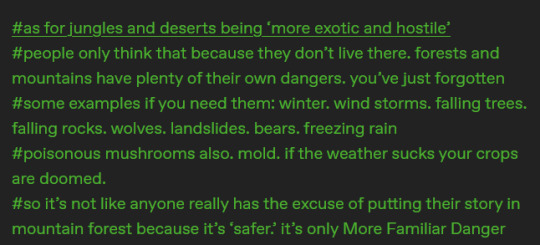
This is very true, and as someone from a subtropical region who has never truly seen snow, to me the danger that cold weather represents is, let's use the word, "exotic" when I read into writing. Things do get cold here, but the fact that there are entire months where things get cold enough that nothing grows and staying outside can outright kill you is not something I would get used to easily.
This is ESPECIALLY relevant when you're doing worldbuilding on pre-industrial societies. Nowadays we can go to the store in the deep of winter, but when most of the population is composed of subsistence farmers, the above dangers are more than fatal. In temperate regions, a great deal of effort in daily life was spent into getting ready for the winter; storing harvested crops and meat in one way or the other until the spring. A harsh winter or a bad harvest could and did mean people just starved to death.
In tropical and subtropical regions, you don't usually get a season where nothing grows. Actually, you do, most have a rainy and a dry season of some sort (in my region, you do get a relatively strong winter, but the main difference is rainy/dry), so the pace of life is regulated by rain, and there's also a greater diversity of crops (see for example the milpa/three sisters system of the Americas, still used today). It doesn't necessarily mean that tropical and subtropical regions had better food all the time, since they also faced the same challenges of dealing with bad harvests, droughts, and more (DROUGHTS, especially, are the kind of civilization-ending event), but they did sustain overall high population densities and extensive systems of irrigation. I'll admit I read this long ago and don't know where to look at it, but a good comparison would be the higher density of villages and small plots in rice-producing regions compared to those in more temperate places. The Americas were completely disrupted by European colonization so it's hard to make sweeping statements about them but if we believe 1491's research (there are some points in dispute there), they had very, very high population densities, and partly this must be because of year-round cultivation of a great variety of tropical and subtropical crops.
Indeed, cold places far away from fishing, for example, often had low populations because there simply wasn't enough reliable crops to support them. Until the widespread adoption of a calorie rich crop that can tolerate cold conditions. Can you guess which it is?
#cosas mias#worldbuilding#my point is that in all the world the pace of pre-industrial life was guided by the seasons and agriculture#but they don't work the same in all the world#and we see enough of it in temperate regions#but almost none of it about tropical and subtropical places
229 notes
·
View notes
Text
Nikaposting Pt 1: Crypto-Religion
This is the first of a series of posts about Nika & associated religious practice in the One Piece world. As I write and post the rest of the series, I’ll add links to this header.
Pt 2: Symbology & Syncretism | Pt 3: Joyboy was Shandian | Pt 4: Sun God Tropes
Enormous credit to @oriigami for being my discussion partner through all of this and having a substantial influence on the final product. Check out our ao3 series Joyful for a narrative rather than analytical take on the Nika tradition, and definitely go read her OP blog @kaizokuou-ni-naru for meta and translation fun facts.
-
The Nika Cult is a Crypto-Religion
Terminology note: I will be using cult in these posts in the sense of “cult of worship,” rather than in the modern pejorative sense. Additionally, I tend to use “tradition” rather than “religion” as a general term, because “religion” is a messy and difficult to define concept, while “tradition” is much more inclusive of traditional practices, folk beliefs, and cults of worship that may not be considered religions by Western scholarship.
Raise your hand if you saw Kuma’s church and Bible, concluded “oh, the Nika stuff is basically One Piece Christianity,” and moved on with your life.
It’s an easy assumption to make, and for all I know authorial intent may well stop there. I’m not Oda. I’ll never be able to guess what goes on behind those fish eyes of his. But a second look at the worldbuilding around both Nika and Christianity in One Piece brought me to a very different conclusion: that the Nika cult is a crypto-religion and is, in Kuma’s case, using the outward appearance of Christianity as camouflage.
First of all: We have ample evidence that Christianity (or some variation of it- I’m fascinated by the implied existence of such things as One Piece Jerusalem and the One Piece Council of Nicea) does exist in the One Piece world, and is both fairly widespread and quite legal. Flevance was pretty explicitly Catholic (Law went to church as a kid), Miss Monday and Mother Carmel masqueraded as nuns to imply harmlessness, many if not most of the graves shown in the series are crosses, whatever Usopp was on about with that exorcism equipment, and, yes, Kuma’s church and Bible.
Even mentioning the Nika cult, on the other hand, is grounds for the government to assassinate you with extreme prejudice.
A crypto-religion is what happens when a religion is suppressed to the point that its practice is grounds for exile, torture, and/or execution: Some people will convert. Some people will flee into exile. Some people will die. And some people will outwardly adopt the dominant religion, but will continue to practice their own traditions in secret; ie, they’ll create a crypto-religion.
One of the more famous examples of this is the post-Spanish Inquisition crypto-Jews of Spain and Portugal, who converted to Christianity in public but kept what Jewish traditions and rituals they could in private. To this day, descendants of these conversos whose families have been Catholic for centuries are discovering that their family tradition of lighting two candles on Friday or not eating pork on Saturday are in fact the legacy of a violently suppressed heritage. There are countless other examples of crypto-religions throughout history, both among Jews (my own personal field of knowledge) and among other traditions (for an example that would be known to Oda, the crypto-Christians of Japan).
There’s no way the Nika cult could have survived except in cryptic form. If it ever had physical infrastructure in the form of temples or pilgrimage sites, the government would have sought them out and demolished them long ago if they were not adequately disguised, especially in World Government member states like the Sorbet Kingdom. Likewise, anyone foolish enough to speak publicly about Nika will be summarily assassinated.
In fact, I have doubts that the Nika cult ever existed outside cryptic form, at least in a significant or long-lasting manner. It was specifically introduced as a slave tradition, likely nigh-exclusively oral, practiced in secret either from its inception—if Nika was a figure created by slaves, including the buccaneers—or for a very long time—if it was the cultural or ethnic tradition of the buccaneers, which spread from enslaved buccaneers to non-buccaneer slaves because Nika was a figure that resonated with them. I tend the favor the second option, but either has merit.
As @oriigami said when we were talking about this, Kuma has a church. Kuma has a bible. Kuma worships a god about whom absolutely nothing is written except in the oldest texts.
Additionally, I’ll expand on this more in pt 2 of this series, but the pendant Kuma leaves for Bonney, a large circular sapphire surrounded by eight smaller circular sapphires, matches the circular symbol inset into the crosses of his church. Bonney immediately identifies the pendant as a sun even though it really doesn’t look like one, and it can be surmised therefore that it’s a Nika amulet, and the sun with disconnected rays a Nika symbol. Following this read, and especially because this symbol occurs across the world in other contexts (see pt 2 for my thoughts on that), its presence in the church is a very careful bit of architectural sleight of hand on the part of whichever of Kuma’s ancestors built the place- echoing a very common practice of real-world crypto-religion adherents to mark the true nature of their allegiances and houses of worship in ways only those in the know might recognize.
And on a storytelling level, Kuma’s entire presence in the narrative and in the world has been a tragic saga of appearing to be one way until he’s revealed, again and again, to be the opposite. It makes thematic sense for him to be fooling the world about his faith as well!
#nikaposting#sun god nika#gear 5#opmeta#bartholomew kuma#meta tag#zephflix original#if i hadn't dropped out of college i'd be a religious studies major and this tag is how you know
261 notes
·
View notes